HEADLINES | 3
BACK TO BASICS
Experience Matters’ new executive director, Wendy Cohen, refocuses on group's original mission


HEADLINES | 3
BACK TO BASICS
Experience Matters’ new executive director, Wendy Cohen, refocuses on group's original mission

Infertility can take an emotional toll, but a new organization, Fruitful, aims to provide support for women and couples in the Valley who are struggling to conceive a child.
“Our goal is to be there mainly for emotional support,” said Chani Levertov, co-founder of Fruitful. “Even though we’re a Jewish organization, we’re open to everyone who needs support and we offer programs for individuals and couples.”
In 2013, Levertov, who also is the co-executive director of the Chabad of Downtown Phoenix, was experiencing secondary infertility. After her first child, she and her husband, Rabbi Levi Levertov, were having a difficult time conceiving another baby. Frustration settled in and she needed a place to vent. She discovered that she was not alone.
Fruitful traces its roots to a monthly coffee date when Levertov would meet with a friend who also was experiencing infertility. They shared their concerns as they both navigated their personal fertility challenges. Levertov helped to found Fruitful after she met more women and couples who were going through what she was experiencing. Levertov said Fruitful meets a need in the Jewish community to discuss infertility and pregnancy loss.
“They believed women and couples needed and deserved more,” said Lauren Hendeles, a Fruitful board member. “More



Turn
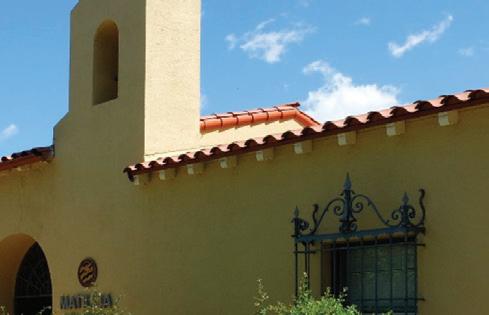
Police in Lake Havasu City are investigating an act of vandalism at the city’s only synagogue.
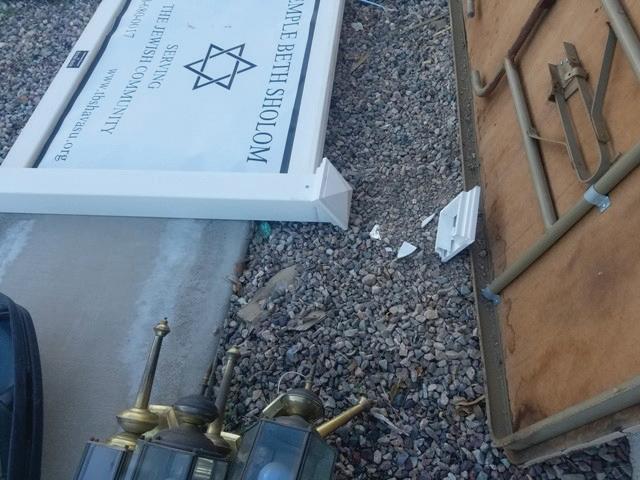
Congregation leaders at Temple Beth Sholom discovered the vandalism, which police believe occurred between 8 p.m. on Dec. 27 and 8 a.m. on Dec. 28. So far, there are no suspects or leads in the case.
“It appears that about eight
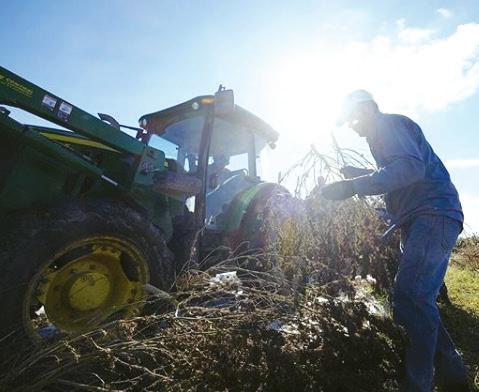 JANET PEREZ | MANAGING EDITOR
JANET PEREZ | MANAGING EDITOR

Are Available for Jewish Day and Overnight Camping Experiences.
SYNAGOGUE
CONTINUED FROM PAGE 1
exterior light fixtures were damaged,” said Lake Havasu City Police Sgt. Tom Gray. “It appears that they had been ripped out of the side wall. There was a large sign that was knocked over and there were some other fixtures around the property that also appeared to have been knocked over and damaged in some way.”
A Star of David mosaic was also damaged. Temple Beth Sholom leaders had no comment on the incident.
For more information and application materials: (602) 230-7983
www.jewishfreeloan.org

Don’t need help with Jewish Summer Camp experiences, but could use an interest-free loan for something else?
Please visit our website or contact us at the JFL office.
WWW.JEWISHAZ.COM
According to the Arizona regional office of the Anti-Defamation League, the Lake Havasu City case was recorded as Arizona’s last anti-Semitic incident of 2018. During the first 10 days of December, the ADL reported six antiSemitic incidents across the state. Most took place in the Valley, with one occurring in Yuma.
“This act of vandalism at Temple Beth Sholom in Lake Havasu City is very disturbing,” said ADL Arizona Regional Director Carlos Galindo-Elvira in a statement. “There is no place for hate in Arizona. ADL Arizona reached out to congregational leadership to express solidarity and concern. We also reached out to the Lake Havasu City Police Department and appreciate their efforts in responding and investigating this hate incident.”
Gray, however, said it is too early in
Lake Havasu City police are investigating an act of vandalism at Temple Beth Sholom, the city’s only synagogue. A tile on a Star of David mosaic was among the items damaged.
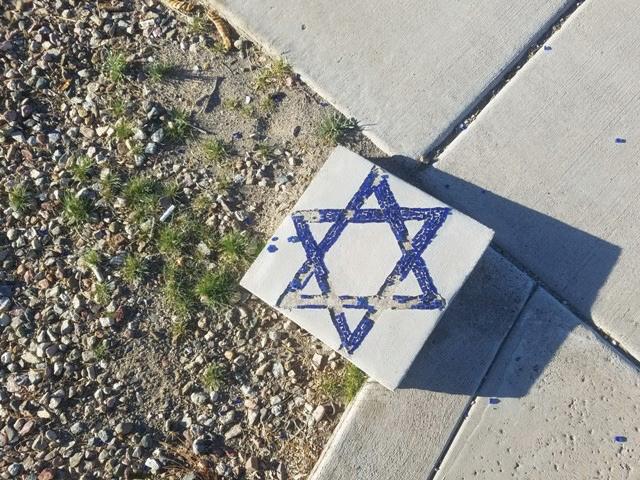
the investigation to label the vandalism a hate crime.
“At this point, we have no evidence to support that, so at this point we’re not classifying it as a hate crime,” Gray said. “There were no witnesses, there were no cameras, but we were able to collect some evidence that is currently being analyzed. But at this point, we don’t have any other suspect information on whether it was one individual or multiple individuals.”
Gray said the dollar amount of the damage to Temple Beth Sholom, which was founded in 1992, was about $1,000. As it stands now, anyone arrested in the case would face a misdemeanor criminal damage charge. However, if it is determined that the vandalism was a hate crime, the perpetrator or perpetrators would face a felony charge.
Gray added that the synagogue sits on a busy street and investigators are combing the area to see if there were any witnesses to the crime or whether surveillance cameras from neighboring businesses captured the incident.
“The synagogue is located on a welltraveled street, so possibly someone will come forward with some information,” Gray said.
In 2015, Temple Beth Sholom was vandalized by a male suspect who threw rocks at the synagogue, chipping its stucco exterior and cracking a window. Gray said no arrests were made in that case.
In response to the latest incident, Gray said Lake Havasu City police would be conducting extra patrols in an around the area surrounding the synagogue. Lake Havasu City is about 200 miles west of Phoenix, close to the borders of California and Nevada.
“We live in a relatively safe community, so hopefully this is just an isolated incident,” Gray said. JN
OFFICE HOURS 8 a.m.-5 p.m. Monday-Thursday 8 a.m.-12:30 p.m. Friday
12701 N. Scottsdale Road, Suite 206, Scottsdale, AZ 85254 Phone: 602.870.9470 | Fax: 602.870.0426 | editor@jewishaz.com | advertising@jewishaz.com circulation@jewishaz.com | www.jewishaz.com
PUBLISHER | Jewish Community Foundation of Greater Phoenix EDITORIAL DIRECTOR | Liz Spikol

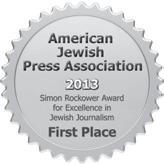
MANAGING EDITOR | Janet Perez
STAFF WRITER | Nick Enquist CONTRIBUTORS | Joel Zolondek
ADVERTISING SALES CONSULTANTS | Jodi Lipson
ADVERTISING COORDINATOR | Julie Goggin
PUBLIC NOTICES | Joan Romano
CIRCULATION | Bill Sims
PRODUCTION COORDINATOR | Cheyenne Bass
PUBLISHED EVERY FRIDAY DEADLINES
EDITORIAL: Noon, Tuesday 9 days prior to publication
ADVERTISING: 11 a.m., Friday 3 days prior to publication
Jaime Roberts, Publisher | 2013-2016
Florence Newmark Eckstein, Publisher | 1981-2013
Cecil Newmark, Publisher | 1961-1981
Pearl Newmark, Editor | 1961-1981
M.B. Goldman, Jr., Founder | 1948-1961

“THERE WERE NO WITNESSES, THERE WERE NO CAMERAS, BUT WE WERE ABLE TO COLLECT SOME EVIDENCE THAT IS CURRENTLY BEING ANALYZED.”
SGT. TOM GRAY, LAKE HAVASU CITY POLICE DEPARTMENT
JANET PEREZ | MANAGING EDITOR

Sometimes, even the advisers need some advice.
As part of an effort to refocus on its core mission, the nonprofit Experience Matters has hired Wendy Cohen as its new executive director. Experience Matters connects retired professionals to nonprofit organizations that need assistance in certain areas.
Cohen was hired after Experience Matters’ board of directors developed and implemented a financial restructuring strategy to manage costs following shortfalls between funding and operating expenses.
“With Experience Matters now financially stable, our immediate goal is to refocus on our core mission and to grow both the number of nonprofits we serve and our pool of talent to help solve social issues in the community,” Cohen said. “We are now at a place where we can build upon that foundation to make an even greater impact throughout Maricopa County.”
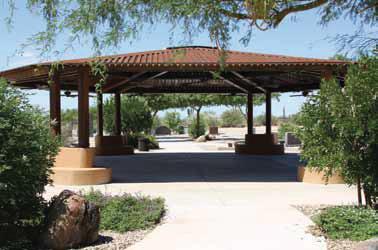
Cohen was most recently senior consultant for practice programs with the American Gastroenterological Association (AGA) in Bethesda, Maryland. Cohen’s recent move to the Valley came about when her husband was named dean of humanities at Arizona State University.
Cohen said Experience Matters has “a very unique organization model.” She added that she also enjoys working for the organization because it is not focused on a certain niche in the nonprofit arena.
“We are broad-based and cover the full spectrum of nonprofits, whether that’s related to education, health care, animals, you name it,” she said.

Cohen is making herself more visible to the community in order to recruit more volunteers and let nonprofits know that Experience Matters is there to help. Experience Matters works with nonprofits of all sizes, so pairing its

volunteers’ skills with an organization’s needs is imperative.
“The volunteers at small nonprofits are so overwhelmed,” she said. “They’re focusing on their mission, which is delivering new services, but they have a very limited budget. They feel that there’s no resource for them other than hiring a consultant and they get the sticker shock of seeing that and they shut down and try to do it on their own. That’s were we come in.”
Anne White was in the first cohort of Experience Matters volunteers. She offers nonprofits the skills she developed after working for the American Cancer Society for years. And her skills are vast.
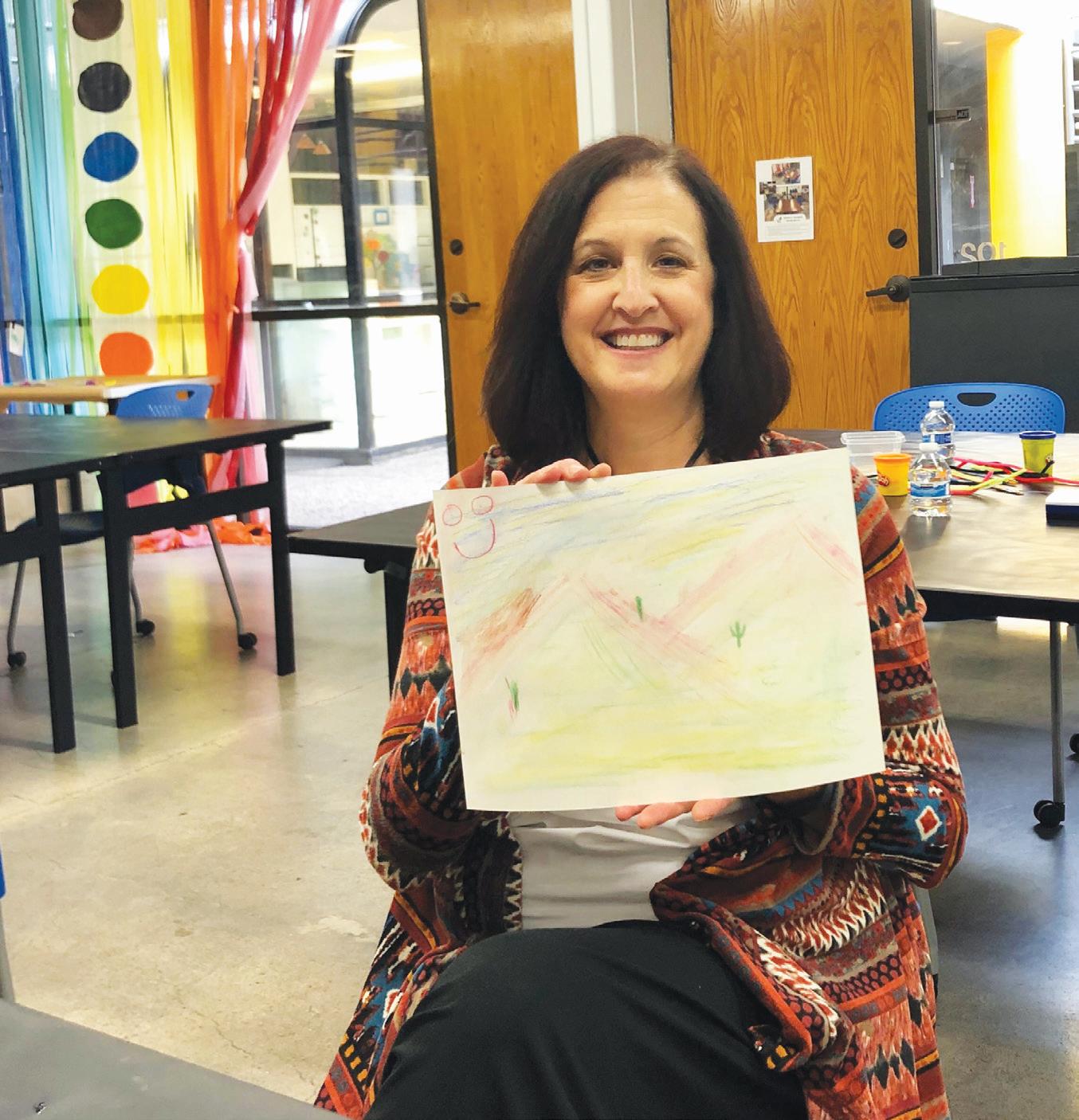
“My focus is usually on the fundraising area, the infrastructure, the board development and strategic planning,” she said. “Some of the organizations that I work with have a multimillion-dollar
budget and some of them have budgets under $500,000 or even lower. We can spend a year with them because it takes that long for people to understand what they should be doing, how they should be doing it and to give them all of the tools they need.”
While most Experience Matters volunteers spend six months to a year with a nonprofit, others can find themselves working for years. That was the case with Arnold Jackson, who worked at Honeywell for 27 years before moving to the faith-based nonprofit Tanner Community Development Corporation, where he worked for 13 years.
As he was entering the ministry, he was asked by officials at the city of Maricopa and the Maricopa Association of Governments to help them start an age-friendly initiative.
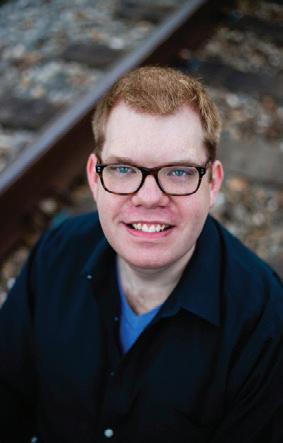
“It was really supposed to be a year, but one thing led to another and it’s four years later,” he said. “At the end of the month I’m going to be leaving the city of Maricopa, but it’s just because work from the ministry that is taking more and more of my time.”

Even though he will no longer be working with Experience Matters, Jackson said he will continue to be an advocate for the group.
For her part, Cohen not only will continue to recruit volunteers and match them to nonprofits, but she also will communicate with donors about how their money is being used. In addition, as Experience Matters celebrates its 10th anniversary this year, Cohen said the organization will be expanding senior services and will soon announce a partnership with Intel.
“I’m committed to helping nonprofits and the community at large by helping them achieve their goals through our volunteer program.” JN
INFERTILITY CONTINUED FROM PAGE 1
HEADLINES information needed to be offered. Validation needed to be given and connections needed to be made.”


The U.S. Centers for Disease Control and Prevention’s Family Growth survey found that between 2004 and 2010, one in eight couples reported having trouble getting pregnant or sustaining a pregnancy.
Hendeles and her husband were coping with a miscarriage and struggling to conceive. They were private about it, because they felt ashamed and didn’t know anyone facing the same challenges.
After attending a public event hosted by Fruitful and meeting Levertov, Hendeles started attending meetings and later became a board member. She helped launch Fruitful’s website. In 2018, Fruitful became a 501(c)(3) nonprofit.
As well as monthly support group meetings and awareness events, Fruitful offers several different programs. Women and couples can attend social events, individual women can receive oneon-one support from other women who have completed their fertility journey, and people can attend educational events that feature experts in reproductive health and therapists specializing in maternal mental health.
Both Levertov and Hendeles think more people should take the time to learn about some of the issues that infertile women and couples experience so they can develop a more empathetic attitude. This is why the two women coordinate awareness events for people who aren’t experiencing infertility and may not realize how taxing it can be.
“The events are a way to break the silence and the shame that some couples sometimes feel,” Levertov said, adding that many couples are under tremendous societal pressure from family, friends and even their synagogues to have children.
“When you think about Jewish life in particular, it’s easy to see how someone struggling with infertility can feel alone,” Hendeles said. “You walk through the doors of a synagogue and see strollers at the entry. You hear about every birth, bris and bar mitzvah during the rabbi’s announcements.”

Hendeles added that many who are feeling the pressure of not being able




to conceive also experience emotional reactions from certain phrases or external triggers. These can range from pregnancy announcements on social media to plotlines on a TV show to even a backto-school display in a store.

Even a well-meaning friend or family member who is trying to offer advice can come off as insensitive. A phrase that sounds as harmless as “you’d make a great parent,” or “I want to be a bubbe” can be an emotional trigger.
“When you’re in the thick of infertility, it feels like the world merely exists to remind you that you are childless,” Hendeles said.
The advice both Levertov and Hendeles hope other people take away from their events is to listen and to not make assumptions as to why someone can’t get pregnant. Pregnancy talk might sound lighthearted, but in reality it can cause sadness or shame.
Since the group’s founding, Levertov has had two more children and Hendeles has given birth to her first child. Both women said Fruitful is looking to expand even more as they hope to help those dealing with infertility feel supported, empowered and validated.
“There are so many individuals and couples in our community who are suffering in silence,” Hendeles said. “They are our neighbors, our friends, people we go to synagogue with, and we may often be oblivious to their pain.” JN
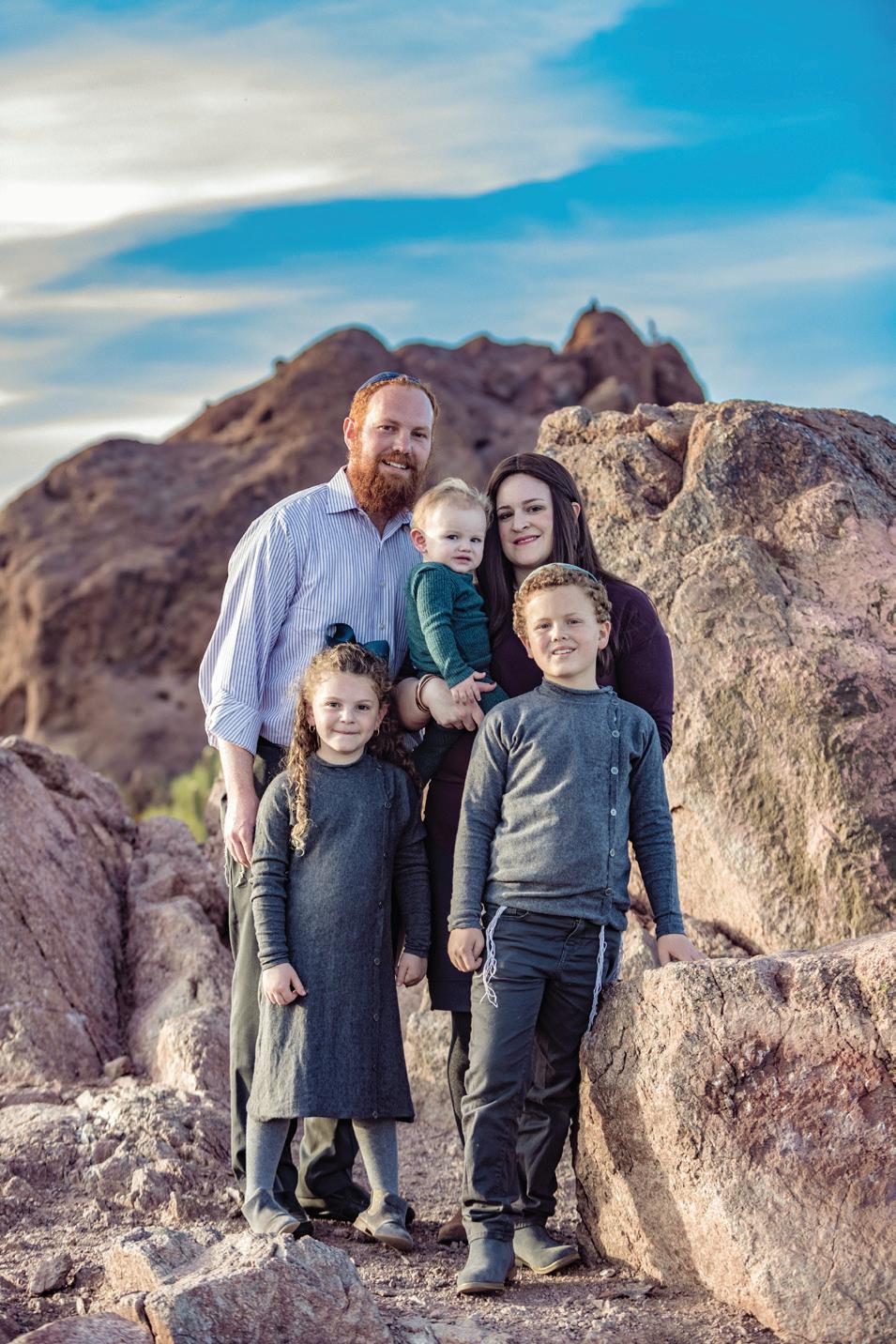
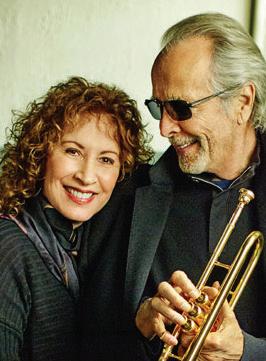 NICK ENQUIST | STAFF WRITER
NICK ENQUIST | STAFF WRITER
Hollywood may still reign supreme in the film and TV arena, but Israeli filmmakers are contending more than ever for American viewers, as they distribute their work to audiences via streaming services.
The Bureau of Jewish Education (BJE) will launch its 2019 Passages series with a lecture by film historian and educator Eric Goldman on Jan. 13 at the Ina Levine Jewish Community Campus. His topic will be “Israel’s story through cinema, from the movie ‘Exodus’ to the Netflix miniseries ‘Fauda.’ ”
“I use film as a text for understanding changing cultures and evolving societies,” said Goldman, the founder and president of

Ergo Media Inc., a film distribution company specializing in Jewish cinema. “I’ve been looking at mainstream Israeli films over the course of Israel’s 70 years, and by analyzing how they reflect over a changing Israel.”
A former curator of film for the YIVO Institute for Jewish Research, Goldman has written extensively on American Jews in cinema, as well as Israeli and Yiddish film. He is currently working on a new book about Israeli cinema.
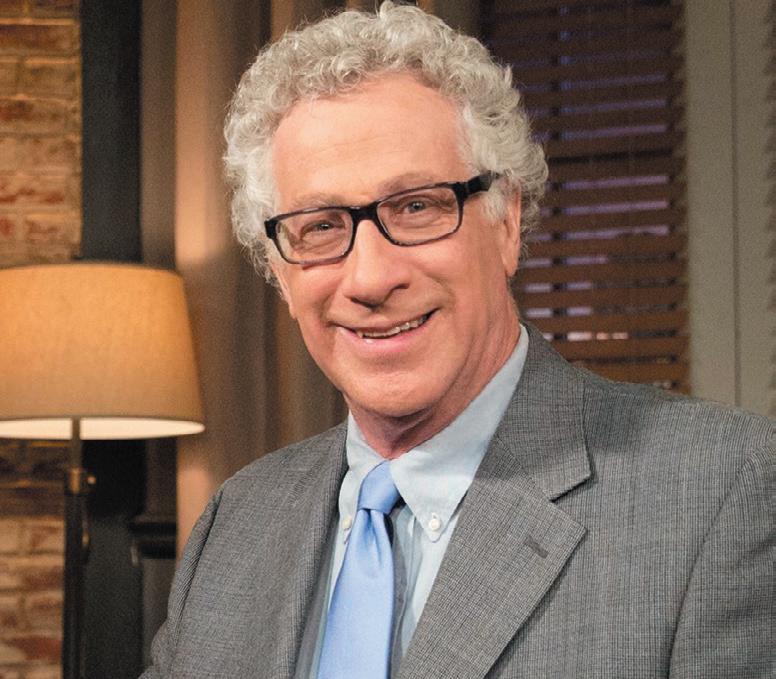

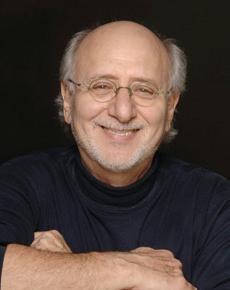
For his upcoming lecture, Goldman plans to review the history of Israeli cinema, which he says didn’t really begin until a
decade after the founding of the country. However, his main focus will be on the contemporary Israeli film industry and its films are being distributed in America.
“In the ’50s, they didn’t have a film school. There wasn’t even a film laboratory in Israel back then,” Goldman said. “Right now, we’re seeing a lot of different films and TV series that are finding their way onto Netflix for Americans to watch.”
Today there are 13 Israeli film schools that Goldman said are producing talented writers and directors who will continue to grow the nation’s thriving film industry.
BJE Director of Adult Learning and the Jewish Community Library Elaine Hirsch is excited to see Goldman return to the Valley for the lecture series and for attendees to learn more about Israeli film culture.
“He’s spoken before about how Jews have been portrayed in the media from


Eddie Cantor to Woody Allen,” Hirsch said. “I don’t think everyone is aware of how popular the Israeli film industry is becoming in the United States.”
Hirsch, who organizes the annual series, said the upcoming Passages will showcase some fascinating speakers who will lecture on a variety of topics such as arts, politics and religion.
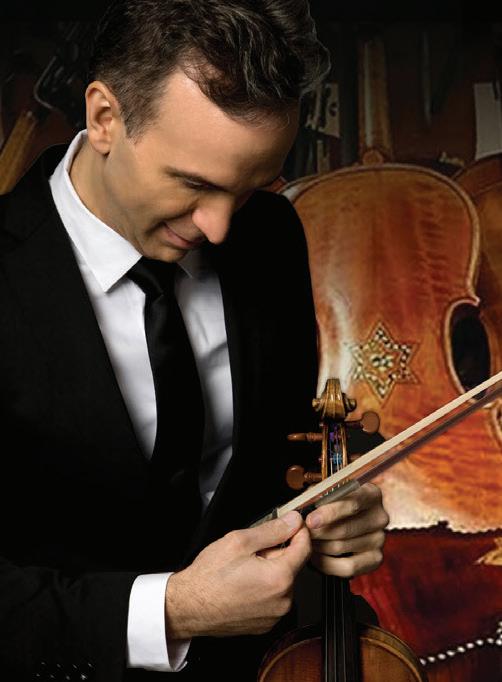
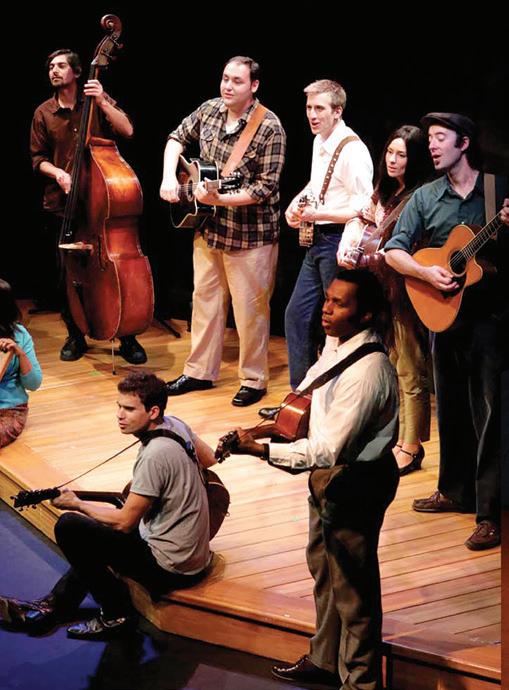
Upcoming lectures will feature The Jerusalem Post’s White House correspondent Michael Wilner discussing the role of the media in the Arab-Israeli conflict, a look at the creation of “Fiddler on the Roof” and the Violins of Hope event.

The BJE’s Passages lecture series has presented speakers to the Valley for more than 40 years. Hirsch said Passages is BJE’s strongest source of donations.
“Passages enables us to be the pluralistic learning environment that we are for Jews of all persuasions,” she said. JN
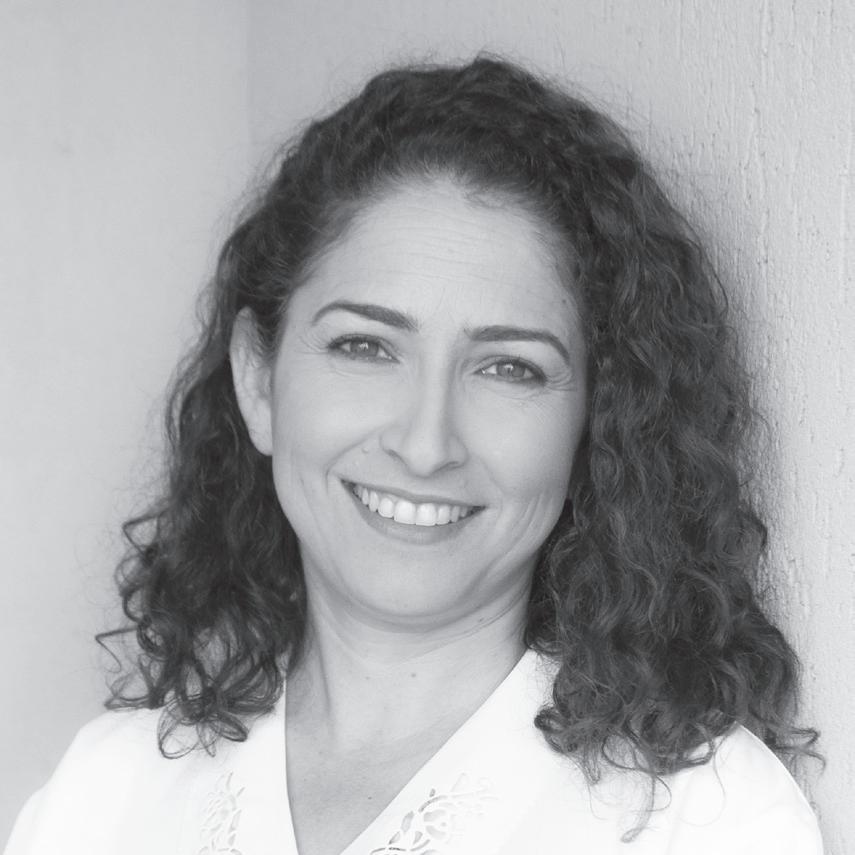 NICK ENQUIST | STAFF WRITER
NICK ENQUIST | STAFF WRITER
is not the most accessible for emergency relief. He oversees all the operations in the area, which include police, fire, search-and-rescue and counterterrorism.
rockets have been fired into the Gaza region, destroying much of the area’s agricultural land.
The rocket attacks have resulted in
Uziyahu said that everyone has a role to fill in any of these emergency situations in order to make sure that the community is safe. This includes training
Surprisingly, terrorism isn’t the biggest concern for the chief security officer of Israel’s Central Arava region, Nadav Eylon.
Though terrorism isn’t far from his mind, Eylon really focuses his efforts on preparing his community for natural disasters such as earthquakes, flash floods and rockslides.
“We’re pretty familiar with disasters in Israel,” Eylon said. “But we also know that everyone is a potential volunteer, everyone is a potential angel that can help when the time is necessary.”
Eylon will represent the Central Arava Region at an upcoming Jewish National Fund (JNF) event, “The Magic of the Negev Desert: From East to West and Everything in Between.”
The event is designed to discuss why living in the remote areas in the Negev is critical to the survival and growth of Israel.
Despite being a remote region, the Arava is the third-largest area in Israel.
Central Arava also is known for its vast agricultural production. According to the nonprofit Nefesh B’Nefesh, the region has more than 400 different farms that produce more than 60 percent of Israel’s fresh vegetable exports.
With just more than 3,000 residents in Central Arava, the area, Eylon notes,
to be as transparent as you can in order for the people to know that they can count on you when something happens and know who they should turn to if they have a problem.”
Michal Uziyahu, the JNF liaison to the Gaza Envelope region, will also attend the upcoming event. Uziyahu was previously a JNF ambassador tasked with educating thousands of Americans about recent barrages of rocket attacks and fire kites.
Since March 2018, thousands of
both are focused on strengthening their respective communities.
When things are bad, Uziyahu said, it’s easy to feel alone. But volunteers are available to help respond in emergency situations in her area. And managing expectations and apprehension also helps.
“The first thing that you feel when you go through what we call an emergency routine day-to-day is to begin to expect it,” she said.
grateful to the JNF and to our American friends who are supporting us.”
Eylon has heard it said that the Israelis are considered to be the last pioneers.

“I know it’s a cliché, but we really take lemons and turn them into lemonade,” he said. “Making the desert bloom is what we’re setting out to do.” JN
For more information about the event, which will be held on Jan. 15 in a private home, email dreback@jnf.org or call 480-447-8100, ext 964
Late last month, at a synagogue in Rio de Janeiro, Israeli Prime Minister Benjamin Netanyahu proclaimed his love for his new bestie, Brazil’s incoming president, Jair Bolsonaro. According to Netanyahu: “It’s not just friendship … it’s a pact of brothers.”
We understand, of course, that nations need to have diplomatic rela tions with other nations. And we are painfully aware that as Israel is still shunned by a good portion of the world community, it needs to welcome relationship-building opportunities with those willing to engage. As such, to the extent Bolsonaro’s election promises to ease the strain of Brazil’s past tense relations with Israel, there is reason for optimism. And the new president’s pledge to move Brazil’s embassy to Jerusalem is a good thing.
But to call a man like Bolsonaro a brother, or “yedidi,” Hebrew for my friend, as Netanyahu did, is really troubling. Here is the man Netanyahu has embraced: He is a far-right former army captain who has praised Brazil’s former dictatorship and its decades of military oppression. He has insulted women, descendants of slaves and gays, going so far as to say: “I’d prefer [to see] a son of mine die in an accident than [to be] a homosexual.” So what does Netanyahu find so attractive in this guy?
Netanyahu has cultivated good working relations with other strongmen, including Russian President Vladimir Putin. This has been so, even as Russia has increased its presence in the Middle East, and has supported Iran and Syria, Israel’s sworn enemies. Nonetheless, Netanyahu appears to have navigated good relations with Putin, and we understand the value of such statecraft.
But we don’t understand Netanyahu’s embrace of Bolsonaro. Nor do we understand his attraction to Hungary’s authoritarian prime minister, Viktor Orban, whom Netanyahu welcomed to Israel last summer as “a true friend of Israel.” And yes, that’s the same Orban who praised the leader of Hungary’s pro-Nazi government during World War II, has promoted a conspiracy campaign against Hungarian-born Jewish financier George Soros, railed against refugees despite there being nearly none entering his country, threatened native Roma and strangled democracy during his four terms in office.
Netanyahu has also made common cause with Poland’s increasingly undemocratic government. Last year he praised a government statement on Polish involvement in the Holocaust, which glossed over the complicity of many Poles in Nazi-led atrocities, and which was roundly criticized by Yad Vashem.
We are concerned with Netanyahu’s growing right-wing brotherhood. Although these guys say they are friends of Israel, and may even take positions seen to be in Israel’s short-term interests, they openly trade in anti-Semitism and promote conspiracy theories and fearmongering of the “other.” In the long term, these ultra-nationalist strongmen cannot be good for the Jews. Note to Netanyahu: Effective diplomacy does not require the abandonment of basic moral values. And it shouldn’t make brothers out of shortterm “partners” whom you wouldn’t bring home to meet your sister. JN
Letters must be 200 words or less and include the writer’s full name, address and phone number or email address. Letters are edited for content, style and space. Send your letters to Editor, Jewish News, 12701 N. Scottsdale Road., Suite 206, Scottsdale, AZ 85254; email letters@jewishaz.com.
Both before her ascension to speaker and in the short time since, Pelosi has shown herself to be a determined foil to the president. She has projected calm and clarity of focus in contrast to the president’s mercurial behavior and unpredictable policy pronouncements. But can she get the job done?
Eight years after losing their majority in the House of Representatives, and two years after losing the White House, the Democrats are once again firmly in control of the House. What will they do with that power?
As expected, Speaker Nancy Pelosi (pictured below) overcame the opposition to her leadership. She now faces the challenge of focusing the disparate voices and conflicting inter-party agendas of the majority caucus on the important work ahead. She also needs to address the delicate question of setting the right tone for ruling party behavior in the House. Tough, smart and disciplined, Pelosi will undoubtedly do her best to maintain party control, but given the current toxic political climate and uncompromising moral certainty of the contending voices in her party, Pelosi faces a significant challenge.
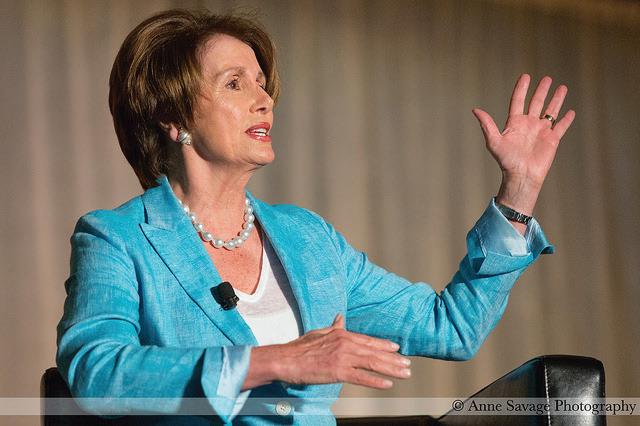
Pelosi’s first challenge, of course, is the government shutdown and its crippling effect on government operations, severe financial impact on an increasing number of government worker victims and the debilitating effect of our national dysfunction on our country’s image. And that’s all separate from the political and financial implications of the wall dispute.
When the president said he would be proud to hold the country hostage by shutting down the government over not getting his way on the border wall, Pelosi demurred, and refused to support border wall funding. The president called her bluff, and the shutdown ensued. Since then, Pelosi and fellow Democrats (and an increasing number of Republicans) have been working to reopen the government.
But even as Pelosi has been working on the shutdown issue, some in the Democratic caucus are
The Torah Study in Jewish News’ Jan. 4, 2019 issue included the wrong photo of Rabbi Shmuel Tiechtel, director of the Chabad at ASU. The correct photo is to the right. Jewish News apologizes for the error. JN
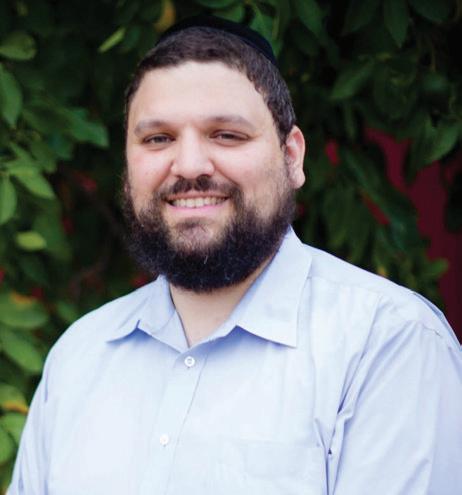
already brandishing articles of impeachment, seemingly hungry for the spectacle of embarrassing the president, distracting him from the affairs of government and otherwise frustrating his agenda during the remaining two years of his term. Pelosi, however, counsels restraint. She wisely wants to wait for the completion of the Mueller investigation to see if there is anything worth pursuing and to determine whether there is bipartisan support for further action. That approach makes sense.
In the meantime, Congress has ongoing oversight responsibilities, and we urge the Democratic majority to focus on the party’s bread and butter issues: addressing health care, commonsense gun legislation, infrastructure, voting rights and immigration reform.
Pelosi has said that she wants to work with the president, not against him. That’s all good. But given the political gridlock in Washington, how can she get that done?
According to columnist Michael Warren, there are three ways to influence the president: Convince him that he’ll be loved, remind him of his campaign promises and communicate with him indirectly. We look forward to seeing Pelosi on “Fox and Friends.” JN
We are having the wrong conversation about education. Year after year, it is reported how poorly students perform on standardized tests. And year after year, the conversations focus on classroom curricula (which should be more rigorous), the teachers (who need better and more training) and the professional development (which millions are spent every year).
However, these conversations ignore the real change needed: the standardized tests themselves. Instead testing data is mined, discussed, collated, color-coded and then spit out to show what is wrong with curriculum, teachers, professional development and even our students.
What the data actually shows is that standardized tests do not measure what our students know or what they can do. The tests are outdated, for an outdated purpose, and many students continue to feel like failures as we use the tests to measure who they are and their trajectory of success beyond high school. This, along with the changing landscape of education, has brought about much research in the area of student disengagement in school, including the manifestation of behavioral challenges, absenteeism, depression and anxiety, and a look at how tests inform the types of teaching and classroom environments that are being created in schools.
Samuel Betances, an i ns pirational speaker who talks about Trauma Informed
Education (TIE), discusses how to reframe the way we look at students who act out or struggle in school. Well-intentioned educators and counselors have spent so much time asking students, “What’s wrong with you?” when the question should be, “What’s happened to you?” His words shine a light on the need to challenge conventional practice about how we look at students in this world of AP tests, SATs, ACTs and so on. There is nothing wrong with our students; instead they are part of a system that has “happened to them,” where standardized tests play, I would argue, too big of a role in their learning. That is not an education system. That is a system built on a foundation of misleading results and flawed measures.
So, what do we do?
The challenges are vast, and it seems we stop short of trying small incremental changes because we (schools and educators) are lost in a sea of expectations. College admission seems to be the top reason why these test scores are so revered. However, as argued in his recent book “What School Could Be,” Ted Dintersmith suggests that college has become a pit stop rather than a road to success. Having a college degree no longer guarantees a job, and colleges are not preparing students for the economy they will enter.
One vignette about MIT students gets to the heart of what our school system is “doing” to our students. These college engineers who received “stellar” test scores
were unable to reason through lighting up a bulb when presented with the materials. This reinforces the point that grades and scores are not good indicators of future job prospects or success.
In thinking about these challenges, what are the implications for Jewish day schools? As independent institutions, day schools have (more) freedom and ability to be nimble in their pedagogical and assessment choices. The argument to stay the traditional course oftentimes is that we need to position our students competitively for the college admissions process. As the pressures of college admission weigh on teachers and students alike, the way we teach at the upper levels becomes more about students’ transcripts than the realworld, relevant work students could be doing, or perhaps already are. As I have written before about innovation in schools, what could possibly be more innovative than changing how we define success and actual learning for our students?
Admittedly, college admission has not quite caught up to the changing and improving trends in education, but day schools can join a movement that has.
The Mastery Transcript Consortium is working to answer the (right) question: How can high schools show a student’s “unique skills, strengths and interests?” Its goal is to provide colleges with a holistic understanding of a student, while also allowing schools to provide “a rigorous, interdisciplinary curriculum that will best
BEN
“Sand and death.” With a phrase that sounded strangely poetic, U.S. President Donald Trump prophesied what lies ahead for the armed forces of the United States should this country maintain a military presence in Syria indefinitely. Given Trump’s past utterances on the same subject, these off-the-cuff remarks in
the White House Cabinet Room on Jan. 2 were hardly shocking, but what came right after was, shall we say, unexpected. Iran’s experience of sending its troops into Syria had left the Tehran regime with a similarly bleak perception of its neighbor, Trump suggested. “Iran is no longer the same country. Iran is pulling people out
of Syria,” the president said. “They can do what they want there, frankly, but they’re pulling people out, they’re pulling people out of Yemen. Iran wants to survive now.” That last point should not be dismissed as out of hand, even if it was as part of a stream of consciousness on foreign policy that also contained preposterous
prepare our students for a complex and interconnected world.”
To date, out of the approximate 200 independent schools that are part of the Consortium, there is only one Jewish day school participating — Gann Academy in Boston. What would it take for more Jewish day schools to join the movement?
There is no doubt that this type of change would be extremely hard and time-intensive, but this would offer a radical improvement for our students: interdisciplinary, real-world learning environments and curricula. With their distinct curriculum, including Jewish history, text and language, Jewish day schools could highlight the incredible skills, knowledge and analytical abilities that students obtain in a dual curriculum using a mastery transcript as a template.
Exploring the Mastery Transcript Consortium could move Jewish day schools in a new direction and provide our students with the type of learning that should be happening — student-driven, deep, meaningful and real-world-ready instead of test-ready. It’s time to change the conversation so that our schools move student learning in the right direction and ultimately bring the college process along with them. JN
claims (e.g., that the Soviet Union, which invaded Afghanistan in 1979 to prop up the Communist regime in Kabul, did so “because terrorists were going into Russia.”)
Trump is correct — as he made sure to remind us — that Iran’s economy has
SEE SAND, PAGE 9
COHEN | JNS.ORG
PARSHAT BO, EXODUS 10:1–13:16
In Parshat Bo, we learn that God hardened Pharaoh’s heart. This is perhaps the greatest problem in the Exodus story and still the worst of moral conundrums today. It is the root of the great societal ill that causes a breakdown in social trust and empathy. Sadly, it is becoming even more pervasive today.
Researchers at the University of Michigan show that over the last few decades, the capacity for empathy in America has dropped 40 percent.
This is the break down of society, when we can no longer see one another, no longer imagine how the other feels, no longer care about how another suffers. How might we respond to such a ubiquitous phenomenon?
Here there is a disagreement between Martin Buber and Emmanuel Levinas. Both agreed that the encounter with the human face should awaken us, even startle us from our slumber.
Buber (1878-1965) believed that we dare not have relationships with other human beings in an “I-It” manner, where the other is merely instrumental
for our own gain or ideology. Rather, we must have an “I-Thou” relationship. Each person has infinite dignity and is not merely a tool for our own means.
Levinas (19061995), the great 20th century Jewish philosopher in France, argued that we cannot relegate our ethics to abstract metaphysical principles. Rather, the encounter with the human face of the other should immediately call us to moral responsibility. We cannot look the other concretely in the face and not awaken our own humanity and thus our most basic capacity for empathy.
“I have always described the face of the neighbor as the bearer of an order, imposing upon me, with respect to the other, a gratuitous and non-transferable responsibility, as if I were chosen and unique — and in which the other were absolutely other, i.e., still incomparable,
and thus unique. But the men round about me are multiple. Hence the question: ‘Who is my neighbor?’ The inevitable question of justice.” (Alterity and Transcendence, 170).
For Buber, the encounter with the other is not a moral or political encounter, but a spiritual one. In fact, extending that encounter beyond the spiritual would make that person instrumental. For Levinas, on the other hand, the face must indeed awaken a moral and political responsibility.
Are we in too much of a rush to pause and truly see each other? Our family members, our community members, members of society, strangers are longing for us to see them. But our closed heart closes our eyes.
All of us have “hardened hearts” at times. Indeed, sometimes, we must close our hearts to protect ourselves within trauma. Sometimes, we must quiet emotional intensity due to “sympathy fatigue.” For some professionals, they must keep their emotions under control. For example, a surgeon should not cry
when cutting into a patient but should bracket the emotional realm of causing harm due to the knowledge that the procedure is deemed necessary. On the other hand, if we don’t cry at times, we risk losing our humanity.
Our most righteous ancestors live within us, but unfortunately Pharaoh can live within us as well. Rabbi Abraham Joshua Heschel wrote:
“We are all Pharaohs or slaves of Pharaohs. It is sad to be a slave of a Pharaoh. It is horrible to be a Pharaoh. Daily we should take account and ask: What have I done today to alleviate the anguish, to mitigate the evil, to prevent humiliation? Let there be a grain of prophet in every man!”
Each day, may we continue to open our hearts and truly see one another. JN
suffered severely since he became president. The re-imposition of tough sanctions has come at the same time that Tehran has invested massively in its regional proxies stretching from Yemen to Lebanon, and cutting through Iraq and Syria. Iran’s regime has also been experiencing the only pushback it really understands in the form of frequent Israeli airstrikes on its military convoys and facilities in Syria.
In terms of its relationship with their subjects, Iran’s rulers are also experiencing a degree of turmoil. When Trump said there were “riots every week in every country,” he likely meant the student-led anti-regime demonstrations that ebbed and peaked in 2018, and which have picked up again in the last two weeks following a horrible bus crash in which 10 students from Azad University were killed and 27 injured.
And even within the regime, there are some clerics who are talking up the notion that Iran is in the midst of a “crisis.”
Arguably, the most interesting of these figures is Hassan Khomeini — grandson of the Islamic Republic’s founder, Ayatollah Ruhollah Khomeini — who spoke on Dec. 29 of the “continuous fragmentation of society” under the Islamist regime, “spreading hatred, grudges, hypocrisy, double standards and dishonesty.” Hassan Khomeini’s anxiety is based on his fealty to the governing concept of velayat-e-faqih (“guardianship of the jurists”) introduced by his grandfather. At the same time, given that his family has been marginalized under the present ruling clique, Khomeini Jr. is also engaging in political maneuvering, so it may suit him to present the Islamic Republic as facing collapse. But as far as the Iranian regime itself is concerned, where others see “sand and death” and imminent collapse, they also see opportunity knocking.
In a speech in Tehran on Jan. 3, Iran’s foreign minister, Mohammad Javad Zarif, painted a rosy picture of a multipolar world in which “it is a big mistake to think that there are superpowers.” As a real-world
example, Zarif boasted of Iran’s enhanced status in Syria, alongside Russia and Turkey. But he also cast a broader eye over the opportunities presented by a world composed of multiple powers, advocating the efficacy of propaganda as a means of inspiring “resistance” among one’s rivals.
“The factor that brings about victory is creating public hatred of the invaders,” noted Zarif in a nod to the trusted method of propaganda merchants since Josef Goebbels. That is a clear message that even if we assume Iran is presently retreating, it’s not going to do so quietly. And once the United States is out of the way, it is quite conceivable that the surge of power that Tehran has enjoyed over the past decade will be reinvigorated.
That’s the inherent problem with dividing the world (as both Trump and Zarif do) into zones of influence based on geographic proximity. As is depressingly usual in the Middle East, the Kurds will again be the first victims of this new shift in the power balance; in order to ward off a threatened genocide at the hands of
Turkey, Syrian Kurds may have to turn to Russia, to the Assad regime in Damascus, and ultimately, to the Iranians for military and political assistance. When you realize that assistance would come from a power that, even now, is repressing its own Kurdish minority of more than six million people, you get some sense of the political price America’s Kurdish allies will have to pay for yet another abandonment.
It’s often said that Jews are a civilizational equivalent of the proverbial canary in a coal mine, and that is true of the Kurds as well. In a region that has seen the periodic mass slaughter of thousands of Kurds during the last 30 years — from Saddam Hussein to ISIS — their fate is intimately tied to that of the region as whole. The tremors of Trump’s decisions now, if they are actually implemented, will be felt long after he has departed the White House. JN
Ben Cohen writes a weekly column for JNS on Jewish affairs and Middle Eastern politics. His writings have been published in Commentary, the New York Post, Haaretz, The Wall Street Journal and many other publications.
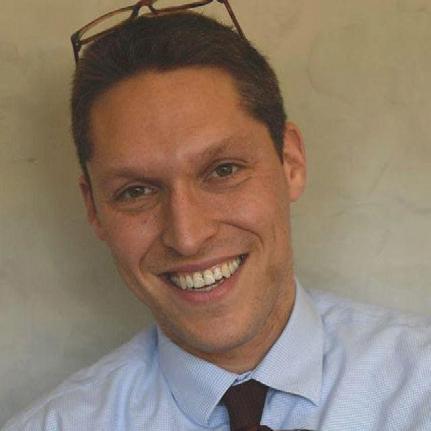
c r e t t o a L i f e o f R e n e w a b l e E n e r g y a n d E t e r n a l I m p a c t . "

P l e a s e j o i n C o n g r e g a t i o n O r T z i o n , f r i e n d s , a n d f a m i l y o f S t e p h e n
D r a i z i n , p a s t c o - c h a i r o f L ' d o r V a d o r S o c i e t y , f o r a s p e c i a l m e m o r i a l
l e c t u r e b y R a b b i D a n i e l C o h e n , S t e v e ' s r a b b i f r o m S t a m f o r d , C T
4pm Reception 5pm Lecture
facebook.com/JewishAZ ◆ twitter.com/phxjnews instagram.com/phxjnews ◆ pinterest.com/jewishaz

“Are you recording?”

It’s a gloomy October afternoon in Winchester, Kentucky, and Brett Goldman wants to make sure I’m getting this.
Goldman, GenCanna’s vice president of public policy, is wearing a black hoodie and blue jeans. His brown work boots squish in the mud as he walks across the 147-acre Hemp Research Campus (HRC), which was previously a research and development facility for a big tobacco company.
“We have already changed the world,” he said. “Every time that a state passes a law to allow for farmers to grow hemp. Every time we talk to legislators. Every time that we talk to farmers. Every time that we talk to consumers, that is changing somebody’s life. That ... that really matters.”
Goldman is walking alongside Newt Cohen, GenCanna’s director of business development and external affairs, and his words are competing with the whirwhir-whir of a nearby forklift. A woman operating the machine deposits crates of hemp plants near a dryer, one of the early steps in a process that will result in hempderived cannabidiol (CBD) oil.
CBD is a non-psychoactive ingredient found in cannabis, not to be confused with tetrahydrocannabinol (THC), the active chemical in the plant that has psychoactive effects on users. Hemp plants with more than 0.3 percent THC are considered marijuana, not hemp, and are not legal to grow without a license.

Cohen and Goldman, who are both Jewish, grew up in the Philadelphia area. They both have a soft spot for their city, but ambitions pushed them out. Goldman has spent much of his adult life in politics. Cohen worked in the hip-hop and entertainment industries. Goldman has lived in Israel and Washington, D.C., while Cohen has resided in L.A. and Las Vegas.
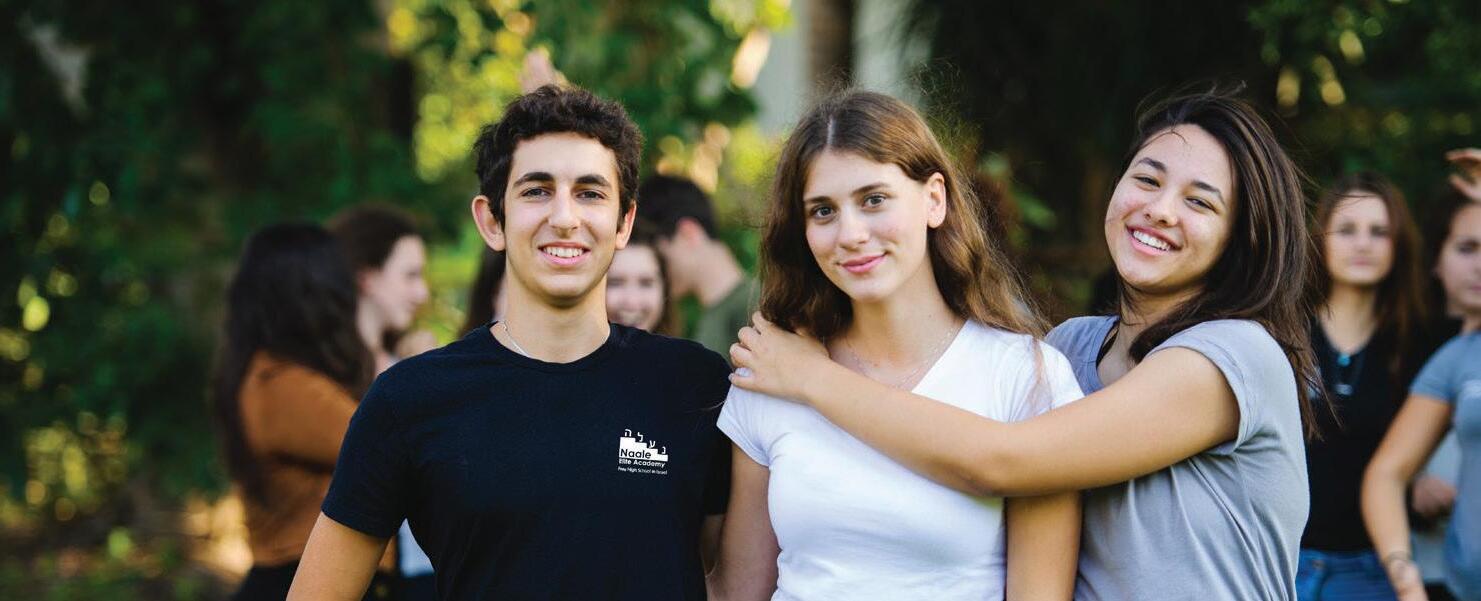
Both found their way to Kentucky, drawn to what they describe as a “once in a lifetime” opportunity — forming part of the nucleus of a rapidly expanding company that harvests, produces and sells what some have called a miracle oil. (GenCanna doesn’t claim any medicinal benefits for its products.)
They’re here to change the world, they
say. They’re here to help farmers farm. They’re here to create jobs. They’re here to be on the frontlines of an industry that yields a product in high demand, and to revive an industry that once helped power Kentucky.
The Agricultural Act of 2014 removed federal restrictions aimed at growing industrial hemp. On May 14, 2018, Arizona Gov. Doug Ducey signed Senate Bill 1098, authorizing the Arizona Department of Agriculture to approve agricultural pilot programs for propagation, processing, manufacturing, distribution and market research of industrial hemp starting in August 2019.
On the federal level, the 2018 Farm Bill, passed by the House on Dec. 12, removed hemp and hemp-derived products from the Controlled Substances Act. The new legislation deems hemp an agricultural commodity, and the DEA no longer has any claim over interstate commerce of hemp products.
Two days later, GenCanna, not missing a beat, announced a $40 million, 100,000-square-foot facility in Mayfield, Kentucky, which is expected to increase the company’s capacity to 10 times its current product, which was 1,200 acres in 2018.
“I’m a big history person,” Cohen said. “It was really always about trying to do something significant. For me, personally, it wasn’t just about the money, even though that’s part of it. A lot of it, for me, was more about creating a shift.”
“We’re pioneers,” Goldman confidently said. “We are pioneers.”
Hemp was part of the United States’ economy before the Marijuana Tax Act of 1937, which taxed those who sold cannabis, hemp or marijuana. But the government encouraged farmers to grow hemp during World War II, with the plant used to make uniforms, canvas and rope.
The passage of the Controlled Substances Act in 1970 made it illegal to grow hemp without a permit in the U.S., effectively putting a halt to what had been a cash crop for farmers, including those in Kentucky.
Cohen started learning about the history of the crop in the early 1990s,
he

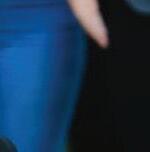
read the nonfiction book “The Emperor Wears No Clothes” while attending the University of Miami. The book, written by Jack Herer, documents the benefits of hemp and the demonization that led to its ban.
“Reading that book changed my life,” Cohen said. “I always thought that if hemp came around it could be maybe the biggest industry in the world, and it could change the world for the better.”
The book planted a seed in Cohen’s head that’d take nearly 20 years to sprout. In the meantime, he started an independent hiphop label, Quake City Records, in 1996. He made connections in the Philadelphia hip-hop scene, building relationships with DJ Jazzy Jeff, Patti LaBelle and several members of The Roots, he said.
Though the label folded in 2000, Cohen stayed in the industry doing consulting work and artist management. He moved to Los Angeles, immersing himself in the entertainment scene.

Then his father got sick.
Cohen was 12 when his father, Alan, had his first heart attack. He never fully recovered, with his health fluctuating throughout Cohen’s childhood. When he was diagnosed with cancer in 2006, he deflected questions from family members about how long he had to live. But it was clear his days were numbered.
Cohen moved to his childhood home for a year and a half, putting his career ambitions on hold, to care for Alan alongside his mother and sister.
His father started to lose his balance. Walking became difficult. Cohen was the only family member strong enough to carry Alan, so for six months he hardly slept, constantly on call, transporting his father from the bed to the toilet and back again.
Alan Cohen died in 2008 from a heart attack. Cohen was dealt another blow soon after when his close friend, Adam Goldstein, better known as DJ AM, was found dead in his apartment from a drug overdose.
“I had a friend who was on top of the world. Everyone wanted to trade places with him,” Cohen said. “I needed to do something different. I just didn’t know what it was.”
That’s when he started hearing rumblings about CBD. The industry started taking shape in 2009-2010, and Cohen made some early connections in Colorado. People were reporting that small doses of CBD were helping ease the effects of seizures.
“Having been a caretaker for my dad and being around all these families that were going through that, it touched me,” Cohen said. “I felt something in my heart.”
He also liked the idea of destigmatizing the cannabis plant and righting past wrongs. Cohen grew up on the tony Main Line in Philadelphia, but his hunger for the hip-hop scene brought him to more diverse Philly neighborhoods, and many of his friends were people of color.
“It was a big culture shock for me to learn how different things were, the different things that people had to go through,” Cohen said.
In 2013, Cohen partnered with GenCanna founders Matty-Mango Miranda, Steve Bevan and Chris Stubbs, joining a company with a triple bottom line of social, economic and environmental wellness.
The group was courted to set up shop by multiple jurisdictions giddy for potential economic growth, but Kentucky made the most sense. A big reason for that was Republican U.S. Rep. James Comer Jr.
Before he took his seat in Congress in 2016, Comer served as the commissioner of the Kentucky Department of Agriculture.
If GenCanna came to the state, he told them, he would have their backs.
The 2013 Kentucky state law, Senate Bill 50, allowed for the production of hemp for agricultural research purposes. The Agricultural Act of 2014 authorized the Industrial Hemp Research Pilot Program.
GenCanna participated in the first year of the pilot program in Kentucky, with a bigger harvest in 2015 serving as a test to see if the crop could be grown at scale. That was around the time when Goldman first came to Kentucky.
“I just showed up and never really left,” he said.
After graduating from Farleigh Dickinson University in 2008, Goldman earned a master’s degree in government and strategy from Interdisciplinary Center Herzliya in Israel. He spent the next few years working on local campaigns throughout the Philadelphia area and ran a startup, the American Israel Business Lab, for two years. After a stint as the executive director of the Tamid Israel Investment Group in Washington, D.C., he started doing consulting and lobbying work.
He leveraged his connections to the Israeli business world in his consulting
HEMP
CONTINUED FROM PAGE 11
practice. When he first sat down with Cohen, at the recommendation of a mutual friend, for coffee, it was to discuss the hemp industry as it pertained to Israel, which is a global leader in cannabis research.
Goldman started working as a consultant for GenCanna in June 2015, balancing his responsibilities as a government affairs manager with Duane Morris Government Strategies. He officially left Duane Morris in June to work full-time at GenCanna.
Four months later, he picked me up at Blue Grass Airport in Lexington, looking tired. He took a swig of coffee. GenCanna is no longer a startup, he said, but many in the company still work startup hours. People wear a lot of different hats.
Soon after I buckled up in the passenger’s seat, where I’d spent much of the ensuing three days as we toured GenCanna’s research campus and farms, Goldman uttered one of his favorite maxims: “Hemp is just like any other crop.”
Perhaps the industry’s biggest barrier to success is awareness, or lack thereof, of what exactly the plant is. Goldman wanted to make clear what it isn’t: marijuana.
It won’t get a user high. But it looks, feels and smells like it will.
As we pulled up to the HRC that first day, Goldman slammed his car door shut and took in the scent: “Smell like college?”
The next morning we arrived at Shell Farms & Greenhouses in Lancaster, where Giles Shell, GenCanna’s director of greenhouse and ag sciences, was watching over hundreds of acres of plants.
A fifth-generation farmer, Giles is built like a linebacker, with calloused hands and a muscle-bound frame. His father insisted he go to college, but he came back to the farm after graduating from the University of Kentucky because, he said, he had “mud running through my veins.”
He settled into life as a tobacco farmer. But the plant gradually became less profitable, Shell said. One day he was tending to one of his greenhouses when the GenCanna crew came by and asked him to consider growing hemp.
Nowadays, Shell is championed as one of the company’s success stories. But, at first, he was resistant. “I wouldn’t even talk to them,” Shell said.
Shell researched the plant. He learned about the apparent benefits of hempderived products. Eventually, the family cut
down on its tobacco production to make room for hemp.
“We had some tobacco on this side, and hemp on this side, and we were standing around in the middle saying, ‘This causes pain. This helps people,’ ” Shell said.
Soon the tobacco was gone, and Shell became an employee of GenCanna, looking over GenCanna’s operation of 50-plus family farmers in the state. As he walked to a plot of hemp plants in midOctober, wearing work boots, blue jeans and a camouflage hoodie, a pair of family dogs scurried by, barking, tails wagging.
“They look happy,” Cohen said.
“Well, I’m happy, too, when I’m out here,” Shell said.
Soon after he decided to shift exclusively to harvesting hemp, his wife asked why he didn’t just stick to tobacco. There was risk in the unknown.
“Well, yeah, I can. But then my name gets written in sand and it washes away with the beach. I want to chisel it in stone, so many, many people for many different generations are talking about what I’ve done,” Shell said.
I ask if it’s always been his goal to be remembered long after he’s gone.
of the CBD marketplace, GenCanna is a bulk wholesale manufacturer.
The parking lot was full, so Goldman backed into a makeshift spot on grass: “When we first started, we had too much parking. Now we don’t have enough.”
I sat around a conference room table with Goldman, Cohen and Stubbs, the company’s chief science officer. Stubbs launched into a lesson about how hemp
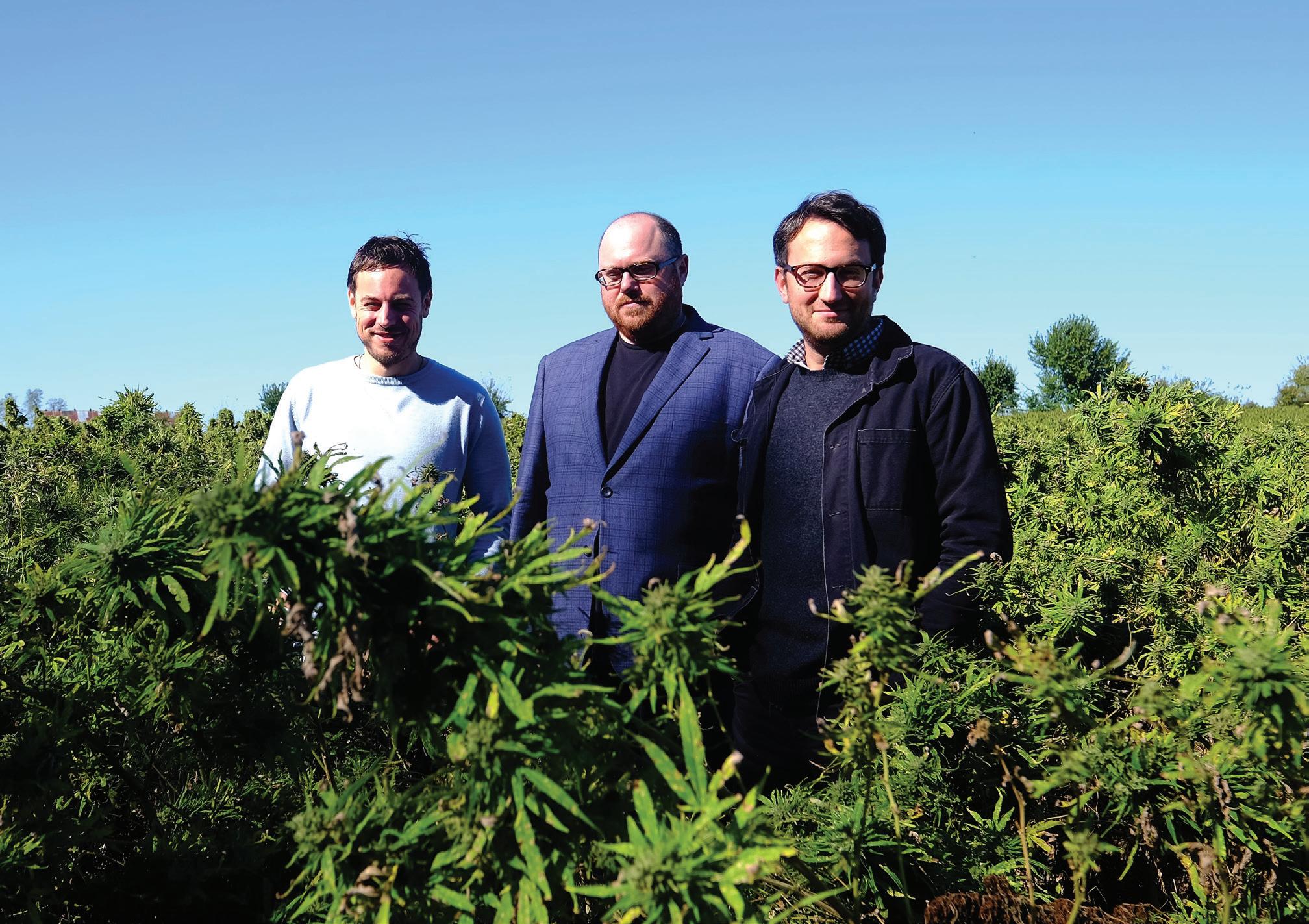
“Most pain is inflammatory-based, and the cannabinoids, the essential oils, the fatty acids found in the plant, are inherently anti-inflammatory, and the mechanisms of action there are still under study,” he said. “We do understand two things. One, the inherent anti-inflammatory activity, where you’re dialing back your immune system’s pro-inflammatory activities, which allows tissue to become less inflamed, which allows you to heal. The other part about
Stubbs popped up from his seat and started drawing on a whiteboard, explaining how CBD blocks the breakdown of endocannabinoids.
“I think any man does,” he said. “You don’t want to be forgotten.”
That’s a common sentiment among GenCanna employees, including Goldman and Cohen.
“There’s generational things that happen, maybe once in a generation, a few times a century,” Cohen said. “There was the industrial revolution, railroads, the beginning of the internet. This right here is in that same category.”
Before the late-December government shutdown, Trump signed the 2018 Farm Bill into law. The legislation is expected to result in even more growth for an already rapidly expanding industry.
GenCanna does not claim medical benefits of CBD oil, with Goldman noting that, at this point, it’s up to consumers to find potential benefits.
On my last day in town, we drove to the part of the HRC where quality assurance, quality control and extraction happens. Once the plant is harvested and dried, it comes here. It’s the final stop before the product is sent to consumers in a variety of forms: hemp-derived CBD, CBD isolate, creams, liquid emulsions. In the ecosystem
“It sounds like voodoo medicine, or snake oil, because it’s like, how can you have an effect with your seizures, your headache, your IBS, your hip pain, your this, your that?” Stubbs said. “The answer is all about the fact that the endocannabinoid system inherently regulates that inflammatory process, that central nervous system and peripheral nervous system process.”
Soon we were joined by Rabbi Avrohom Litvin and his two sons, Rabbi Chaim and Rabbi Shlomo. The family runs Kosher Kentucky International, which certifies GenCanna products as kosher.
The conference room was full, as were the hallways outside. GenCanna employees in white coats, goggles and hair nets shuffled through the halls. As federal restrictions surrounding hemp fade away, GenCanna has plans to expand.
“We’re going to need more parking,” Goldman said.
Stubbs chimed in: “We’re going to need more buildings.” JN
This article was made possible by a grant from the Irving Felgoise Memorial Fund of the Jewish Federation of Greater Philadelphia. The fund was established by the family of the late Irving Felgoise, a printer, in honor of his longtime association with the newspaper field and the Jewish Federation. The Memorial Fund is administered by the Jewish Federation Endowments Corporation. This article originally appeared in the Jewish Exponent, a Jewish News-affiliated publication.
• the ways genetics and genomics help to understand and treat genetic diseases.
• the diverse conceptions of physical and mental disabilities in the sources of Judaism in light of the new discipline of Disability Studies.
• the social, cultural and psychological dimensions of disability.
• the work of Jewish organizations to empower and include people with disabilities.
ASU Jewish Studies presents 2019 Albert & Liese Eckstein Scholar-in-Residence Stanley Mirvis, Harlold and Jean Grossman Chair in Jewish Studies at Arizona State University.
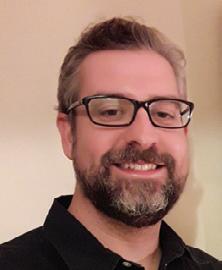
Monday, January 28, 2019 | 7 p.m. | reception following lecture
CutlerPlotkin Jewish Heritage Center
Arizona Jewish Historical Society | 122 East Culver Street, Phoenix

“Jews in the Atlantic World: Being Jewish in the Early Modern Period” explores the ways life in the colonial Atlantic—Western Europe, West Africa, South and North America, and the Caribbean—was a transformative experience for early-modern Jews and Judaism. The story is told through the lives of three Sephardic men who each in their own way embodied the Atlantic Jewish experience: one as a trans-national and trans-religious border crosser who traveled between Spain, France, Brazil, and the Caribbean as well as between Christianity and Judaism, one as the planter patriarch of a racially blended creole family, and another as a trans-Atlantic adventurer who traveled between England, the Caribbean, West Africa, and North America during the 18th century.
sponsored by ASU Jewish Studiess; Harold and Jean Grossman Chair in Jewish Studies; Irving and Miriam Lowe Professsor of Modern Judaism with support from the Dr. Michael Anbar Memorial Lecture in Judaism, Science and Medicine Endowment
personalize them. What you do can be peaceful and serene, or fun and exciting. Here are a few examples of what I’m referring to:
• Your kitchen can be a quiet place in the early hours before anyone else is awake. It’s where you have a cup of coffee in your special cup looking out into your garden or reading your emails. Perhaps it’s taking your vitamins with a crystal or “funky” wine glass. This all depends on how you design your preference for starting the day.
How do you prefer to live? Do you take the time to treat yourself well at home? Do you do things in your home that make you happy and feel good?
Last week, I had a conversation with a client about bringing rituals and ceremony into her home.
She had read one of my articles and realized she wanted to bring her “signature” into her environment.
To do this, she knew she had to better understand herself so that she could customize her personal space.
Of course, her favorite things are very different from yours and mine, and that's what makes this exercise special.
If you want to do the same thing, you have to get in touch with your inner self to determine what you want to express in your most personal spaces.
This type of connection with the self is accomplished by repetition, when you do the same one thing every day and look forward to it. The habits and preferences you practice in your space are what

• Your bathroom can have candles around the tub for relaxation and meditation. You can have a special color toothbrush in a particular glass. Your night clothing can be hanging, waiting for you on a pretty hook. I have a glass that only matches my bedroom color (and doesn’t match anything else in the house), which I take to bed. This is where I take my evening vitamins that I keep on my bedside table in unique containers.
• Any area of your home can contain your favorite things, whether pictures in beautiful frames, private collections, flowers in a vase, personal mementos or printed sayings.

• For fun or whimsy, games you enjoy can have a dedicated area with a table designed in playful colors.
• A ceremony is something you might do when you bring a new piece of furniture into your home — you can bless it and state the intention for it.
When creating personal spaces, all your senses come into play. You can surround yourself with your favorite fragrances, colors, textures, sounds and flavors.

When you make yourself important enough to nurture yourself, you are creating healing. When this healing is experienced and is repeated, it becomes a habit.
As you make changes in your environment, remember this is your sacred space and refuge from the world. Be open to the possibilities.
Look inside yourself — at the true “interior” design — to see what you would like in your surroundings and then make it happen once your vision is clear. Trust yourself and your choices. It takes a great deal of honesty to get what you need and want.
As we talked about doing this, she discovered that better understanding herself in this context required an inventory of her preferences.
It was about identifying her habits and things that give her comfort and connect her to her surroundings.
Interior design is a creative process where there is no right or wrong. If it feels right, it is right! JN
THE HABITS AND PREFERENCESYOU
PRACTICE IN YOUR SPACES ARE WHAT PERSONALIZE THEM. WHAT YOU DO CAN BE PEACEFUL AND SERENE, AND OTHER TIMES CAN BE FUN AND EXCITING.ISTOCK / GETTY IMAGES PLUS/JONATHANSLOANE
You always need help when selling your house or buying a new one. If you’ve not been involved in house hunting before, here are the kinds of experts that can make your real estate transaction move more smoothly no matter your level of experience.
A financial expert can help you find out what kind of home you can afford to buy and help you get pre-qualified for a loan. The fact that you are pre-qualified will strengthen your bargaining position with sellers of houses, according to Randy Hotchkiss of Hotchkiss Financial in Tucson. When you find a house you want to make an offer on, your real estate agent can then present your offer along with the pre-qualification document.
“You might be surprised at how much you will qualify for. But the amount may translate into a larger monthly payment than you are comfortable with,” Hotchkiss said. “So, it is very important to have the comfort level discussion when discussing the loan amount.”
Financial advice and being prequalified can give you an advantage over other buyers. You also want to have that financial expert on hand throughout the buying process to help finalize all the paperwork for a loan once you find your perfect new home.

You need a real estate agent who knows what market trends are and can find a house to fit your budget or help you determine what the right price should be if you are selling your home. Ask mortgage lenders to recommend real estate agents they work with if you need help finding just the right person. You want a real estate agent, of course, who will hunt for homes that fit your wish list.
“With inventory down right now, homes priced right are selling faster than normal,” said Joelle Kahn, Realtor with Tierra Antigua Realty in Tucson. “Sometimes a buyer will have to move quickly to get an offer in if they really like
a home. We can still negotiate closing costs to be paid for by the seller even though it’s a seller’s market.”
Kahn also mentioned that if you’re interested in buying a new build, you should call your real estate agent before you even visit those attractive new homes going up in a subdivision.
“Everybody loves looking at shiny and new model homes, but if you go into that builder’s site sales office and sign in without a Realtor, you are giving up representation on your side,” Kahn said.
“A Realtor can negotiate on your behalf and possibly get you a better deal.”
Another area that might be problematic is appraisals. The buyer has offered a certain price, the seller has accepted it,
and then the appraiser for the lender says the home isn’t that valuable. A real estate agent might then arrange a second appraisal or help negotiate the seller’s price.
If you find a house you like and your offer is accepted, you also want to have a home inspector who can quickly review all systems and parts of your potential home and recommend solutions to possible problems. Usually, a buyer in Arizona has 10 days to have any necessary inspections done on a house. The buyer pays for any inspections.
“Most people’s largest personal investment is their home,” said Dave
Woityra
Estate Services in Tucson. “When people buy stocks or bonds, they tend to review the prospectus that highlights the investment’s assets while describing its liabilities. A home inspection works the same way. So, after an inspection, you’re making an informed decision on what may be the biggest investment in your life.”
Lots of buyers fall in love with houses, he noted, “and then the love affair comes to a screeching halt when the mean old inspector comes up with his report on the house. But things that are broken can be fixed. A Realtor can negotiate for the buyer.”
Inspectors can also be adept at finding problems in houses being sold by flippers who have not done renovations correctly. If major work has been done on a home, like adding on a room or enclosing a covered patio, the construction that was done needed to have a building permit, for example. If you buy without getting that documentation, you may have to bring the property up to code later on. You also want to have roof and termite inspections as well.
On the other hand, if you are selling a home, it’s also a good idea to have a home inspection done before putting a for-sale sign in your front yard. According to Woityra, an inspector can look at the electrical panel and other major systems of the house so that a seller doesn’t run into any surprises that could potentially ruin a deal with a buyer.
In particular, sellers might also want a plumber to check out pipes under a house with a video camera to be sure that tree roots aren’t blocking the plumbing.
With expert help in the complicated world of real estate and finance like this, you as a buyer or a seller will be heading in the right direction before you move into a new home. JN
YOU NEED A REAL ESTATE AGENT WHO KNOWS WHAT MARKET TRENDS ARE AND CAN FIND A HOUSE TO FIT YOUR BUDGET OR HELP YOU DETERMINE WHAT THE RIGHT PRICE SHOULD BE IF YOU ARE SELLING YOUR HOME.ISTOCK / GETTY IMAGES PLUS/STEVE DEBENPORT
CALENDAR Events
ONGOING
‘A Silenced Legacy — Honoring the Music and the Musicians’: Tickets are on sale for the Violins of Hope chamber concert. The concert takes place at 7:30 p.m., Tuesday, Feb. 26, 2019, at Temple Chai, 4645 E. Marilyn Road, Phoenix. Ticket information: bit.ly/2KZFoIG
SUNDAY, JAN. 13
Klezmer Music Festival: noon-5 p.m. East Valley JCC, 908 N. Alma School Road, Chandler. Live music by Yale Strom, Jerusafunk, Chai Tones and Rural Street Klezmer Band. Yiddish Experience workshops, children’s activities and kosher food for sale. Cost: $15 adults, $5 children up to age 12. Tickets: evjcc.org/klezmerfest or 480-897-0588
WEDNESDAY MORNINGS
‘The News Desk’: 10-11:30 a.m., Valley of the Sun JCC, 12701 N. Scottsdale Road, Scottsdale. The class focuses on current events and is led by retired Dr. Michael Epner.


MONDAY, JAN. 14
Women’s League Speaker: 6:30 p.m., Beth El Phoenix, 1118 W. Glendale Ave., Phoenix. Come and enjoy a special presentation, ‘L’dor V’dor: Learning our Jewish History With Our Children,’ by the St. Joseph’s Hospital’s Jewish Chaplain Pam Kaplan. All are welcome. Suggested donation for those who are not members of Beth El Women’s League is $5. RSVP: 602-944-3359 or events@bethelphoenix.com
‘Messillat Yesharim- Reading Classical Texts with a Contemporary Philosophic Lens’: 1-2 p.m., Temple Chai, 4645 E. Marilyn Road, Phoenix. Presented by VBM, the guest speaker is Ira F. Stone, rabbi emeritus of Temple Beth Zion-Beth Israel in Philadelphia. Suggested donation is $18. Register: bit.ly/2GzAqk7
‘The Greatest Jewish Philosopher That Nobody’s Heard Of: A Meeting with Emmanuel Levinas’: 7-8:30 p.m., Congregation Or Tzion, 16415 N. 90th St.,Scottsdale. Presented by VBM, the guest speaker is Ira F. Stone, rabbi emeritus of Temple Beth Zion-Beth Israel in Philadelphia. Suggested donation is $18. Register: bit.ly/2LvQlPh
TUESDAYS, JAN. 15, 22 & 27
Knitting Circle at The J: 1:30 p.m., Valley of the Sun JCC, 12701 N. Scottsdale Road,
Scottsdale. Share the pleasure of knitting and crocheting. Help others with projects and patterns. Can’t knit? We’ll teach you. No reservations required. Information: 480-4817033 or harrietc@vosjcc.org
TUESDAYS, JAN. 15-MARCH 5

Creative Aging classes-Story Telling: 10 a.m.-noon, Temple Solel, 6805 E. McDonald Drive, Paradise Valley. The eight-week course are taught by Kim Porter, who was recently named Best Storyteller by the Phoenix New Times. Presented by Jewish Family & Children’s Service. All classes are open to adults 60 or older. Registration: jfcsaz.org/creativeaging, janet.rees@jfcsaz. org, or 480-599-7198
Israeli Dance: 2-3 p.m., Congregation Beth Israel, 10460 N. 56th St., Scottsdale. The classes are taught by Nancy Stone, a local dance instructor. All classes are open to adults 60 or older. Registration fees vary. Registration: jfcsaz.org/creativeaging, janet. rees@jfcsaz.org, or 480-599-7198
TUESDAY, JAN. 15
‘Civic Engagement Beyond Voting’: 6:30 p.m., Temple Chai Social Hall, 464 E. Marilyn Road, Phoenix. The event is presented by NCJW/AZ. Featured speakers are state Representative-elect Jennifer DeMarre Jermaine, Indivisible AZ Director Tricia Sauer and journalist and filmmaker Civia
Tamarkin. Information: membership@ ncjwaz.org
Art Appreciation: 11 a.m.-noon, Valley of the Sun JCC , 12701 N. Scottsdale Road, Scottsdale. Share the world of art with docents from the Phoenix Art Museum. This month, explore Art Over Adversity. Free. Information: 480-481-7033 or harrietc@ vosjcc.org
WEDNESDAYS, JAN. 16-MARCH 6
Voice Classes: 10 a.m.-noon, Temple Chai, 4645 E. Marilyn Road, Phoenix. Temple Chai choir director Dan Kurek teaches a voice class, providing individual attention. Presented by Jewish Family & Children’s Service. All classes are open to adults 60 or older. Registration fees vary. Registration: jfcsaz.org/creativeaging, janet.rees@jfcsaz. org, or 480-599-7198
WEDNESDAY, JAN. 16
‘Who Gave You Permission? The Memoir of a Child Sexual-Abuse Survivor Who Fought Back’: 7-8:30 p.m., Valley Beit Midrash, 4645 E. Marilyn Road, Phoenix. As an adolescent, Manny Waks, was sexually abused at the ultra Orthodox religious school across the road from where he lived in Australia. When he went public as an adult about his experiences Manny and his family were intimidated and shunned by
their community. Suggested donation is $18. Register: bit.ly/2CrhRKO
THURSDAYS, JAN. 17-MARCH 7
Creative Aging classes-Story Telling: 10 a.m.-noon, Temple Beth Shalom, 12202 N. 101st Ave., Sun City. The eight-week course are taught by Kim Porter, who was recently named Best Storyteller by the Phoenix New Times. Presented by Jewish Family & Children’s Service. All classes are open to adults 60 or older. Registration: jfcsaz.org/ creativeaging, janet.rees@jfcsaz.org, or 480-599-7198
The Sunshine Singers, a Senior Chorus: 10-11:30 a.m., Temple Chai, 4645 E. Marilyn Road, Phoenix. The chorus is led by Dan Kurek, who has 35 years’ experience teaching music and who has been the Temple Chai choir director for nine years. Presented by Jewish Family & Children’s Service. All classes are open to adults 60 or older. Registration fees vary. Registration: jfcsaz.org/creativeaging, janet.rees@jfcsaz. org, or 480-599-7198
THURSDAY, JAN. 17
Blanket Boosters: 9 a.m.-noon, Beth El Phoenix, 1118 W. Glendale Ave., Phoenix. Join the Beth El Blanket Boosters as they create beautiful mitzvah blankets to donate to local children in crisis. Yarn and crochet hooks are provided. Beginners are welcome. Information: 602-684-2606 or blanketboosters@bethelphoenix.com
Women’s Chai Tea Study Group: 12:30-1 p.m., Beth El Phoenix, 1118 W. Glendale Ave., Phoenix. Ladies, meet us on Sunday afternoons for tea and sweets as we study important issues related to Jewish women. Wendy Rozov will lead this discussion group for women and about women. RSVP: events@bethelphoenix.com or 602-944-3359
Environmental activist presentation: 6:30 p.m., Cutler Plotkin Jewish Heritage Center, 122 E. Culver St., Phoenix. Curator Joan Baron,TO3 and the Jewish Heritage Center welcome guest speaker David Baron, an environmental activist and lawyer with Earthjustice in Washington, D.C. RSVP: 602616-0223 or joanebaron@gmail.com
Let’s Eat: Mature Mavens Dinner: 5 p.m. Make new friends as you meet for dinner and socialize. Dinner is separate checks. Contact Bunnye at 602-371-3744 for our current schedule of restaurants and to reserve your place.
Class on the Book of Judges: 9 a.m., East Valley JCC, 908 N. Alma School Road, Chandler. Led by Rabbi Michael Beyo. Free. 480-897-0588 or webbc@evjcc.org
Class on the Babylonian Talmud: 10 a.m., East Valley JCC, 908 N. Alma School Road, Chandler. Led by Rabbi Michael Beyo. Cost: $14. Reservations: 480-897-0588 or webbc@evjcc.org
SUNDAY, JAN. 20
Jonathan’s Walk 4 Friendship: 12:30 p.m., Chaparral Park, 5401 N. Hayden Road, Scottsdale. Jonathan’s Walk 4 Friendship is a 1-mile walk which raises necessary funds as well as community awareness for the Friendship Circle. Information: 602-861-1600
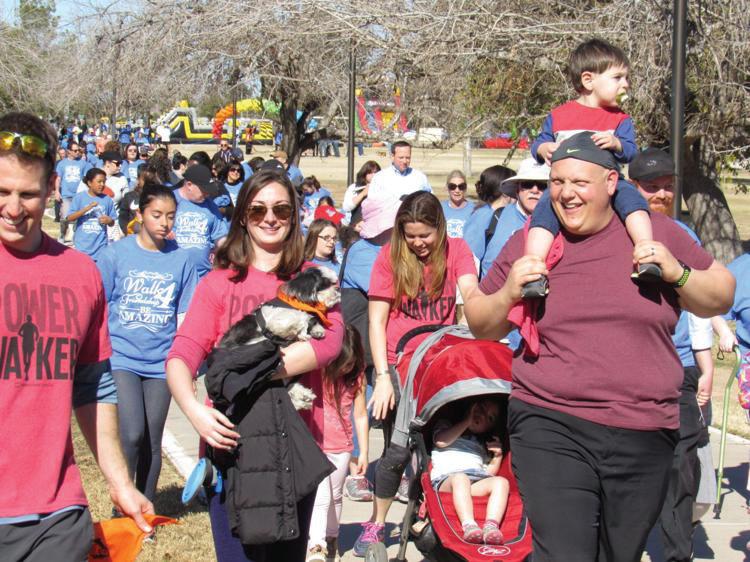
Speaker Series: 11 a.m., East Valley JCC, 908 N. Alma School Road, Chandler.
Speaker: Karolyn Benger. Topic: “The Story of Dinah.” Cost: $14, includes kosher lunch. Reservations required: 480-897-0588 or webbc@evjcc.org.
SATURDAY, JAN. 19
An Evening with Storyteller and Author Marty Brounstein: 6:30 p.m., The Shrine of Holy Wisdom, 5025 S. Ash Ave., Suite B-15, Tempe. Hosted by the Shrine of Holy Wisdom Church and Hillel, Jewish Student Center of Arizona State University, author Marty Brounstein will tell a true interfaith story of courage, compassion and rescue about a Christian couple in the Netherlands who saved the lives of more than two dozen Jews during the Holocaust and World War II.
SUNDAY, JAN. 20
Lecture by Rabbi Daniel Cohen: 4 p.m., Congregation Or Tzion, 16415 N. 90th St., Scottsdale. Please join the congregation as well as friends and family of Stephen Draizin, past co-chair of the congregation’s L’Dor Vador Society, for this special evening in honor of Stephen’s memory. Rabbi Cohen will speak on ‘Becoming a Blessing - The Secret to a Life of Renewable Energy and Eternal Impact.’ RSVP: tinyurl.com/ OTDraizin
Ladles of Love: 9 a.m.-noon, East Valley JCC, 908 N. Alma School Road, Chandler. Volunteers prepare kosher meals to deliver
to homebound individuals. Drivers also needed. To sign up, visit bit.ly/Ladles2018.
Eco-Judaism: 2-4 p.m., Temple Chai, 4645 E. Marilyn Road, Phoenix. In honor of Tu B’Shevat, Rabbi Nina Perlmutter, rabbi emerita for Congregation Lev Shalom in Flagstaff, will explore ancient and modern Jewish teachings about the appropriate relationship between humans and the nonhuman world.
MONDAY, JAN. 21
‘She Who Dwells Within: Shechinah, the Feminine Face of Gd in Torah, Mysticism, and Our World’: 1-2 p.m., Beth Emeth Congregation of the West Valley, 13702 W. Meeker Blvd., Sun City West. Presented by VBM, the guest speaker is Rabbi Tirzah Firestone, a Jungian psychologist, author, and the founding rabbi of Congregation Nevei Kodesh in Boulder, Colorado. Suggested donation is $18. Register: bit. ly/2BCH8jE
TUESDAY, JAN. 22
Terrific Tuesdays: 10-11:30 a.m., East Valley JCC, 908 N. Alma School Road, Chandler. Speaker: Bill Gates. Topic: “Is Fake News Real?” Ages 55-plus. Suggested donation: $4. 480-897-0588 or adrian@evjcc.org.
WEDNESDAY, JAN. 23
A Tribute to the Soldiers of WWI: 11 a.m.noon, Valley of the Sun JCC, 12701 N. Scottsdale Road, Scottsdale. Guy Benoit,
historical researcher and grandson of a WWI veteran, pays tribute to the soldiers of his French hometown and the Lafayette Squadron and Doughboys, including battles fought by the Allies and the American Expeditionary Forces. Members: $5; guests: $15. Register: vosjcc.org/soldiers
FIRST SATURDAY OF EACH MONTH
Kavana Café: 8:45 a.m., Congregation Or Tzion, 16415 N. 90th St., Scottsdale. This is an informal opportunity to learn with Rabbi Micah Caplan prior to Saturday morning services. A light breakfast will be served.
EVERY SATURDAY
Torah Express: noon, Congregation Or Tzion, 16415 N. 90th St., Scottsdale. On Shabbat mornings, during the congregation’s Kiddush lunch, join Rabbi Micah Caplan and other Jewish professionals and teachers from our community for an in-depth study of the Torah portion of the week.
FRIDAY, JAN. 18
Music event: After Shabbat services, north Scottsdale location. Desert Foothills Jewish Community Association will present singer Jesse Washington, who will perform a variety of popular songs, show tunes and uplifting music. Dues are $60 per year and the first visit is free. Information: 480-664-8847
Seniors
FRIDAYS, ONGOING
Taste of Shabbat with Nurit Avigdor: 11:30 a.m.-noon, The Palazzo, 6250 N. 19th Ave., Phoenix. Open to the community. Contact JFCS Senior Center for questions at 602-943-2198.
MONDAY, JAN. 28
Sex, Sexuality & Older Adults in the Sacred Encounter: 1-2 p.m., Valley of the Sun JCC, 12701 N. Scottsdale Road, Scottsdale. Rabbi Richard Address, founder and director of Jewish Sacred Aging, examines human sexuality from a Jewish perspective.
Members: $5; guests: $15. Register: vosjcc.org/sacred
MONDAY, JAN. 14
BNC Roz Fischer Concerts & Conversations: 1 p.m., Palo Cristi Church, 3535 E. Lincoln Drive, Paradise Valley. Presented by the Brandeis National Committee, Ballet Arizona will showcase two dancers demonstrating classic ballet to ballet music. Cost is $7 at the door, no reservations required. Refreshments are included. Information: 602-971-0012 or joansitver@aol.com JN
The Generations After Descendants Forum met at the East Valley JCC on Dec. 12 for a social gathering that included a potluck lunch.
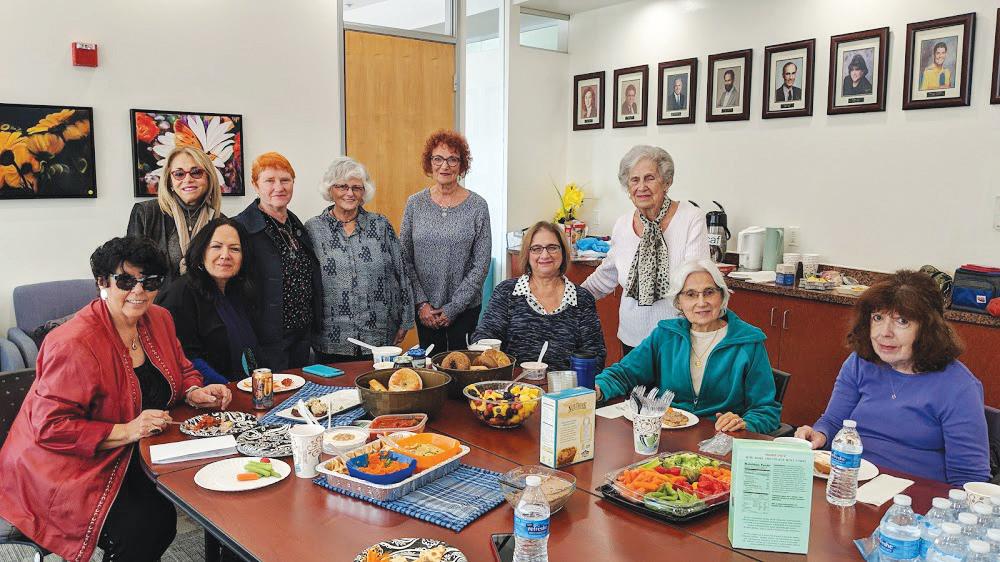
Ilana Kaufman, director of the Jews of Color Field Building Initiative, right, with Valley Beit Midrash President and Dean Rabbi Dr. Shmuly Yanklowitz at Temple Kol Ami. Kaufman gave two presentations on Jewish identity, community and justice.
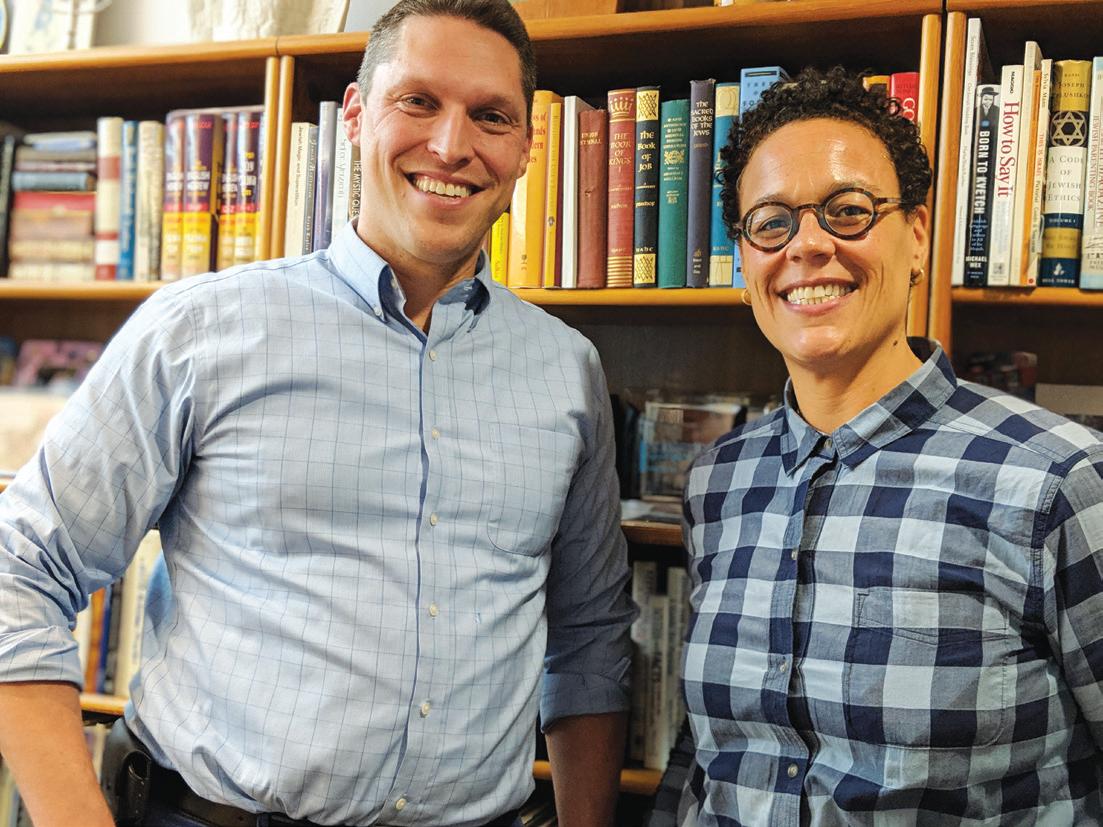
Harold and Linda Mann are having a wonderful time visiting with grandson Benjamin Strite during the Valley of Sun JCC Early Childhood Center’s recent Grandparent Shabbat. More than 200 guests celebrated with visits and songs.
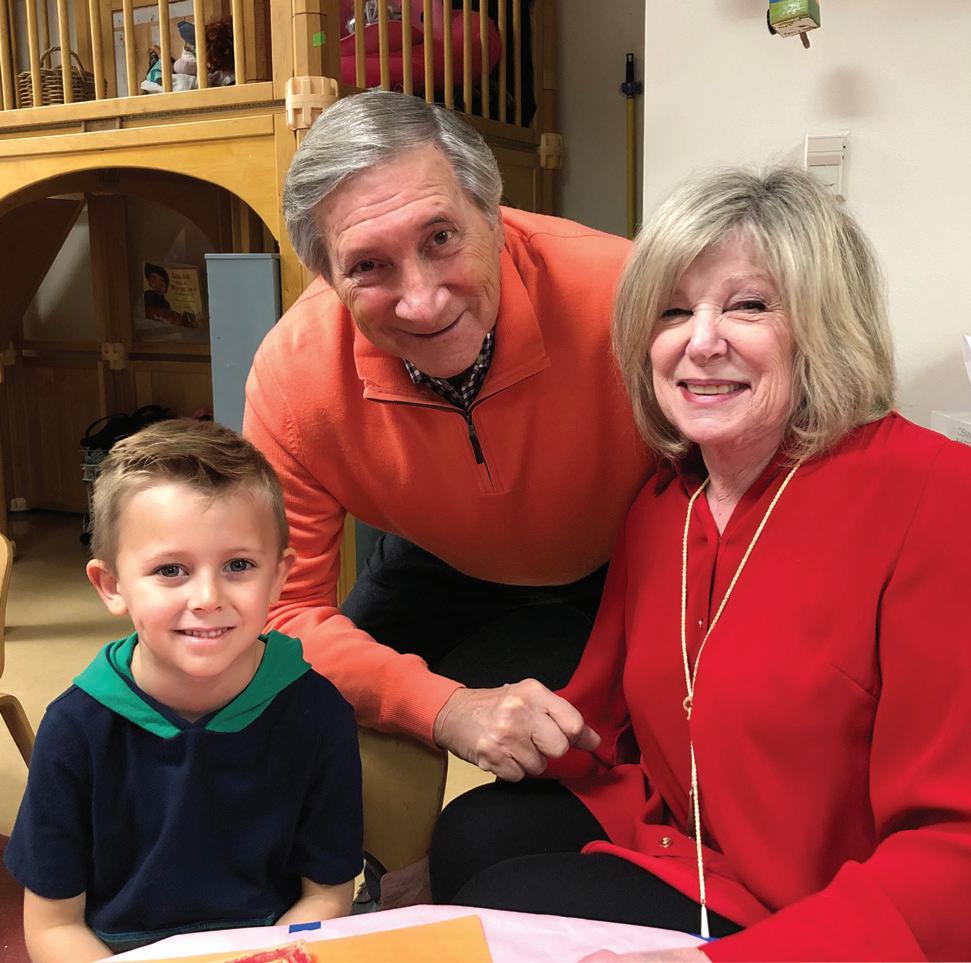
Beth Ami Temple volunteers take part in the Salvation Army’s Christmas dinner. Pictured front row from left, Arnie Schwartz, Carol Sinai, Natalie Eisenberg, Mariellen Miller, Goldie Cohen, Ruth Poles and Halle Miller; back row from left, Bernie Aaronson, Si Eisenberg, Jack Poles and Mel Selbst. Members of Beth Ami have been volunteering to serve Christmas dinners for 15 years. PHOTO
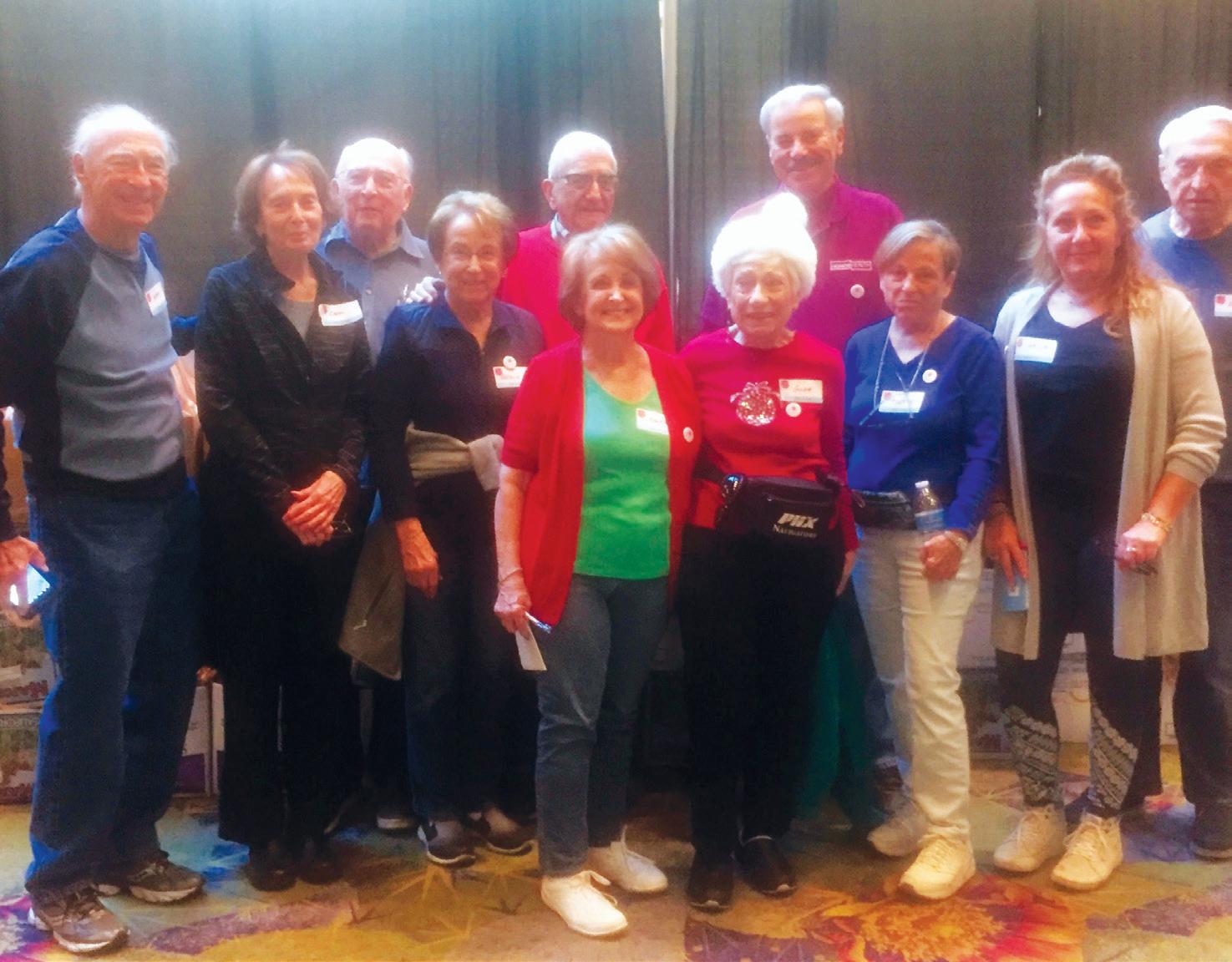
About 350 Temple Chai members of all ages take part in the annual peanut butter and Fluff sandwichmaking event to benefit St. Vincent DePaul. On Dec. 24, volunteers made more than 20,000 sandwiches for hungry people in Phoenix.
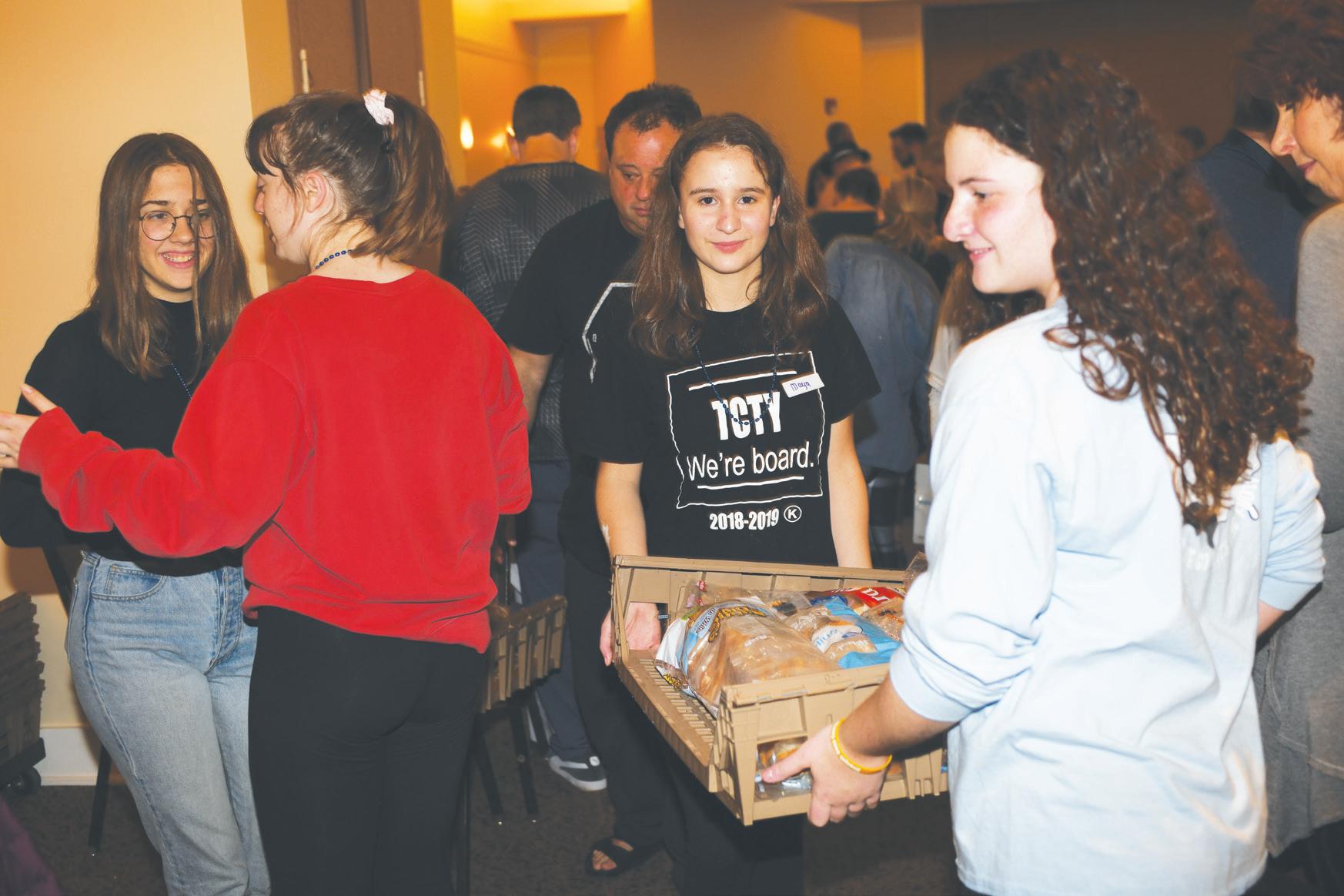
This COMMUNITY page features photos of community members around the Valley and the world. Submit photos and details each week to photos@jewishaz.com by 10 a.m. Monday.

ALEXANDRA LILLY ABRAMS
Alexandra Lilly Abrams will become a bat mitzvah on Jan. 12, 2019, at Congregation Kehillah. She is the daughter of Kimberly and Andrew Abrams of Cave Creek.
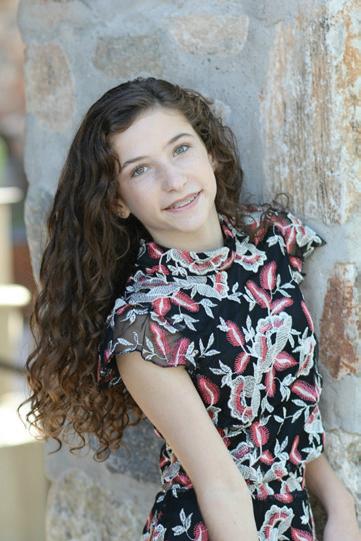
Grandparents are Ilene and Mark Laufman of Madison, Wisconsin, and Diane and the late Robert Abrams of Milwaukee, Wisconsin.
For her mitzvah project, Alexandra collected funds through the PANDA walk for childh ood cancer research.
Alexandra is a student at Scottsdale Preparatory Academy and she enjoys reading and studying, hanging with friends and playing with her sisters, Lauren, Ava and Isabella.
HILLEL CHAIM BRONSTEYN
Hillel Chaim Bronsteyn became a bar mitzvah on Dec. 22, 2018, at Ohr Hatorah. He is the son of Esther and Yakov Bronsteyn of Phoenix.
Grandparents are Aviva Carmen of San Diego, Alon Tolwin of Southfield, Michigan, and Deena and Josh Bernstein of Lawrence, New York.
For his mitzvah project, Hillel volunteered for the Kosher Food Bank. He diligently puts on his tefillin every morning. He is proud and excited to take on the responsibility of mitzvot.
Hillel is a student at New Way Academy and he enjoys baseball, street hockey, basketball, hanging out with friends and family, and Jewish music.
JAKE MILLER
Jake Miller will become a bar mitzvah on Jan. 19, 2019, at Congregation Beth Israel. He is the son of Lisa and Randy Miller of Paradise Valley.

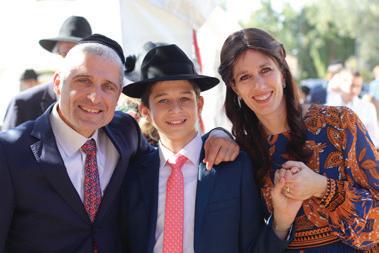

Grandparents are Eileen and Steven Horowitz of Sherman Oaks, California; Suzanne and Philip Goldman of Washington Crossing, Pennsylvania; and Stephen Miller of Manalapan, New Jersey.
For his mitzvah project, Jake will be collecting and donating gently used sports equipment to give to children in need.
A student at Cocopah Middle School, he enjoys basketball, reading, hanging out with friends, spending time with family and watching sports on TV.
MADISON TAYLOR MILLER
Madison Taylor Miller will become a bat mitzvah on Jan. 19, 2019, at Congregation Beth Israel. She is the daughter of Lisa and Randy Miller of Paradise Valley.
Grandparents are Eileen and Steven Horowitz of Sherman Oaks, California; Suzanne and Philip Goldman of Washington Crossing, Pennsylvania; and Stephen Miller of Manalapan, New Jersey.
Rabbi Shamai Kanter, 88, of Phoenix, passed away on Thursday, Dec. 27, 2018. He is survived by his wife of 62 years, Jeannette, their three children, Raphael (Cindy), Elana (Michael) and Ethan (Sue), and nine grandchildren, Rebecca, Eli and Micah; Hannah, Gabi and Jonathan; and Ben, Charlie and Trevor. He was the brother of William Kanter and the late Barbara Fink.
Rabbi Kanter was born in Allston, Massachusetts, on March 27, 1930, to David Kanter and Celia Wexler Kanter, who died giving birth to him. He was first raised by his grandparents and Celia’s devoted sisters Sandra and Molly, and then by David’s seven brothers and sisters (“the folks“), before David’s marriage to Doris Cohen and the expansion of their immediate family with two more children.
Ordained by the Jewish Theological Seminary, and following a United States Air Force chaplaincy, Rabbi Kanter served congregations in Toronto, Canada; Sharon, Massachusetts; and Rochester, New York, where he retired. During his rabbinical career, he also obtained a Ph.D. in religious studies at Brown University in 1974. He published his doctoral research, entitled “Rabban Gamaliel II: The Legal Traditions,” in 1981.
In his spiritual leadership of synagogue communities, he touched countless lives at the most joyous and difficult of times, offering a characteristic blend of warmth, intellect and grounded wisdom within the practice of Jewish law. Quiet, thoughtful and reserved in nature, he preached to his congregants in Sabbath and holiday sermons, delivered extemporaneously from minimal notations, and drew upon a disparate array of subjects and disciplines, from philosophy, history, Bible and Talmud, to physics, psychology and pop culture. At these moments, forging an intimate bond with his listeners, he shared his unique interpretations of a world revealing God in the unlikeliest of places. He was beloved by his family and community and we mourn his passing. Donations in his memory may be made to the Jewish Theological Seminary of America, Hearing Loss Association of America, the Women’s Jewish Learning Center or The New Shul.
the Answer or Response to the O f f i c e o t h e C e r k o f t h e S u p e r o r C o u r t , Y a v a p a C o u n t y A r z o n a M a a c o p y o f y o ur Response or Answer to the other par y at the address isted on the op o this Summons 3 If h s Summons and the other court papers w e r e s e r v e d o n y o u b y a r e g s t e r e d p r o c e s s server or he Sheri with n the Sta e of Ar zona your Response or Answer must be i ed withn T W E N T Y ( 2 0 ) C A L E N D A R D A Y S r o m t h e date you were served not counting the day you were served If this Summons and the other papers were served on you by a registered process server or he Sher ff outside the State of A r z o n a , y o u r R e s p o n s e m u s t b e f e d w t h n THIRTY (30) CALENDAR DAYS rom he dat e you were served not counting the day you were served Serv ce by a reg s ered process server or the Sherif s comp ete when made Serv ce by Pub ication s comp e e thirty (30) days after the date o the f rst publ ca on 4 You can get a copy of he court papers f led in this case from Pet tioner at the address at the top of this paper or from the Clerk of the Superor Cour ʼs Cus omer Serv ce Center
5 Requests for reasonab e accommodat on o r persons wi h disab i ies must be made to the off ce of the udge or comm ss oner ass gned to t h e c a s e a t e a s t f v e ( 5 ) d a y s b e o r e y o u r s c h e d u e d c o u r d a e
For her mitzvah project, Madison visited Ryan House and delivered 400 baked cookies for their holiday party for all the sick children. She learned and contributed her time and energies. It was both meaningful and draining of emotion, yet she was glad she did it. She felt blessed that she had the opportunity to do it.
A student at Cocopah Middle School, she enjoys acting, singing, performing in shows, reading and writing, and hanging out with her family and friends. JN
E F E N D A N T ( S ) : 1 You are summoned to respond to this complaint by f ing an answer w th this cour and payng the court s requ red fee I you cannot a ford t o p a y t h e r e q u i r e d f e e , y o u m a y r e q u e s t t h e c o u r t o w a i v e o r t o d e e r h e f e e 2 If you were served w th this summons in the Sta e o Ar zona, the court must J rece ve your answer o the comp aint wi h n twenty (20) ca endar days rom the date you were served If you were served outside the State of Arizona, th e court must receive your answer to the comp aint with n h rty (30) days from the date of service f the ast day s a Saturday, Sunday or ho iday, you wi l have unt the next work ng day to f le y o u r a n s w e r W h e n c a c u l a t n g m e d o n o t c o u n t t h e d a y y o u w e r e s e r v e d w i h h e s u mm o n s 3 T h s c o u r s l o c a t e d a 6 2 0 W e s t J a c k s o n S t r e e P h o e n x A Z 8 5 0 0 3 4 Your answer mus be in wr ing (a) You may o b t a n a n a n s w e r f o r m f r o m h e c o u r l s t e d above, or on he Se f-Service Center of he Arz o n a J u d i c a l B r a n c h w e b s t e a t h tp /www azcourts gov/under the “Pub ic Services tab (b) You may v s t http://www azturbocourt gov to i l n your answer form electronca ly; h s requ res paymen o an addi ional fee (c) You may also prepare your answer on a p ain sheet of paper bu your answer must include he case number the cour loca on and the names of the par es 5 You must prov de a copy of your answer to the p a nt ff(s) or to he plain if s attorney
ce bu you do need o ma or del ver the NOTICE OF HEARING F rst c ass prepa d postage mai s su fic en Cert ed o r Return rece p s an extra step you can ake to prove that the person you want to have not ce rece ved the not ce Complete a PROOF OF NOTICE orm s at ng how and when you gave not ce to a interested persons DATED November 29 2018 /s/ Comm ss one r Washington NOTICE OF HEARING
Read h s Not ce Carefu ly An mportant court p r o c e e d n g t h a a e c s y o u r r g h t s h a s b e e n scheduled f you do not understand th s not ce, contac a awyer for help
1 NOTICE IS GIVEN that the Pet t oner has f ed w th he Cour a Pet ion for Guard ansh p o a Minor 2 HEAR NG INFORMAT ON A court hear n g has been schedu ed to cons der the Pet t on a s fol ows: HEARING DATE AND TIME 02 07 2019 at 8 30 a m H E A R I N G P L A C E 3 1 3 1 W D u r a n g o P h o e n x A Z 8 5 0 0 9 - 6 2 9 2 C o u r t r o o m 7 HEARING OFFICER: HONORABLE EARTHA WASH NGTON 3 RESPONSE You can f le a writ en response t o h e p e t o n F l e y o u r o r i g n a w r i t t e n r esponse wi h he court ma l a copy of he or g na response to the peti ioner(s), and prov de a copy o y o u r r e s p o n s e o t h e J u d g e / C o m m s s o n er named above at least 5 bus ness days befor e the hear ng Or you can appear n person at he hear ng You must appear at he hear ng only f you w sh to ob ect to the pet t on Jew sh News 1/11, 1/18, 1 25, 2/1


Make a charitable donation to Jewish News and help support Jewish community journalism.


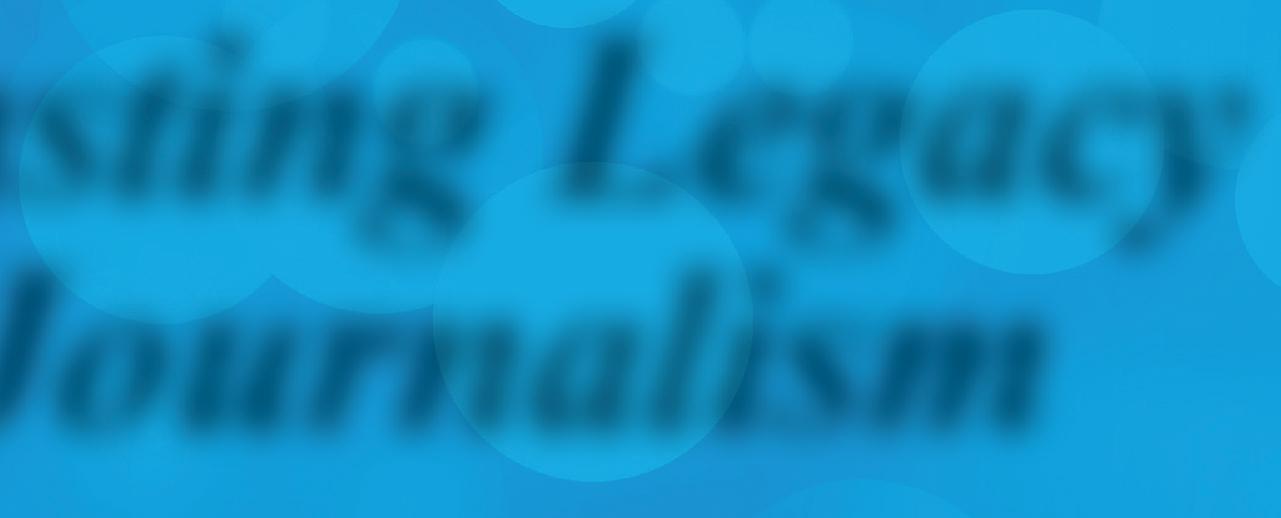
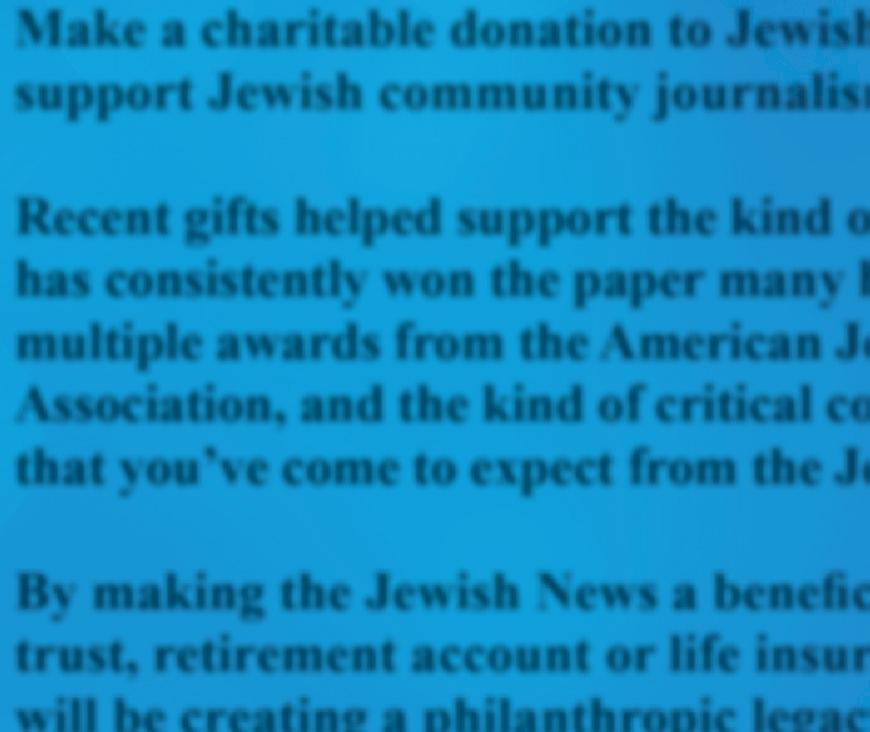



Recent gifts helped support the kind of reporting that has consistently won the paper many honors, including multiple awards from the American Jewish Press Association, and the kind of critical community coverage that you’ve come to expect from the Jewish News.
By making the Jewish News a beneficiary of your will, trust, retirement account or life insurance policy, you will be creating a philanthropic legacy that will help sustain the vibrant voice of Jewish Arizona. Whether you read us in print or online, please help us continue our commitment to bringing you the local Jewish news our community counts on.

Contributions to the Jewish News, a 501(c)(3) organization, are tax deductible. Seek independent professional legal advice before making any change to your plans. 12701 N. Scottsdale Road, Suite 206 Scottsdale, AZ 85254
organizations keep prisoners from being forgotten
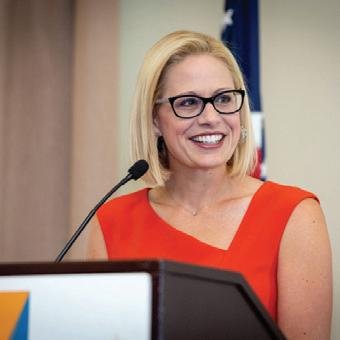
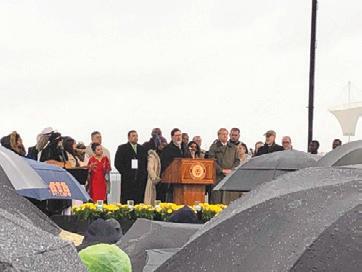
Jewish


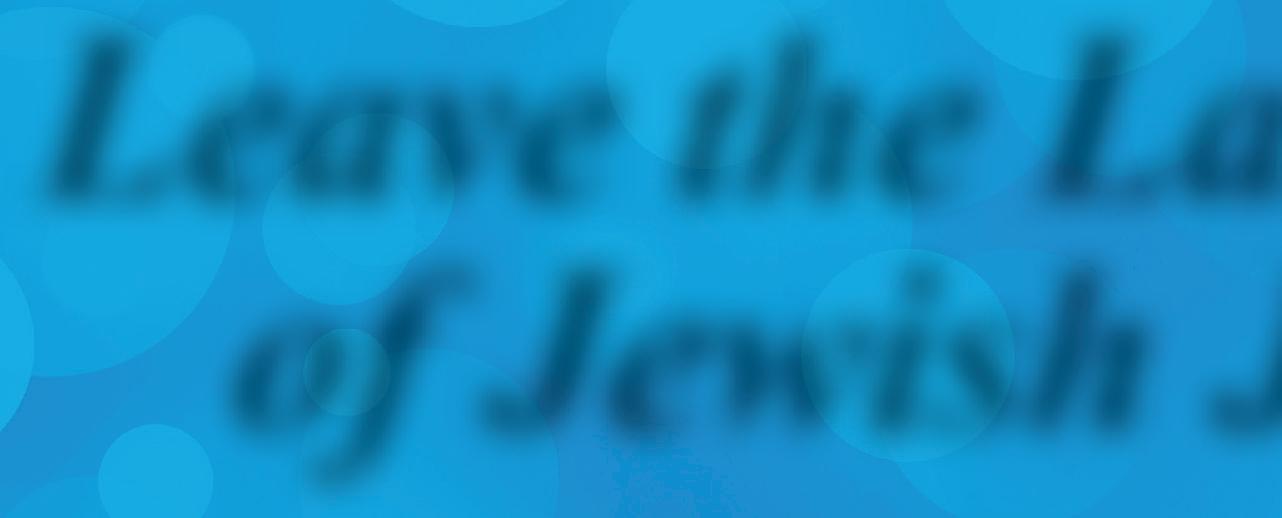
Donate NICK ENQUIST STAFF WRITER Although Jewish prisoners make up less than 1 percent of the prison population nationwide, Rabbi Menachem Katz continues to maintain contact with prisoners to help provide what they need, such as religious texts, prayer services, and to make sure that they are treated fairly. But his work is not easy. Jewish inmates in Arizona, for instance, have refused to meet with Katz, who works with Jewish prisoners all over the country, because of the fear of white nationalist gangs. “We wanted to come visit them, but they said, ‘No, that will be too dangerous for you,’” said Katz, the Aleph Institute’s director of Military and Prison Outreach in Florida. “In Arizona, there is a concern with white supremacy.” According to Katz, there are currently 40 Jewish prisoners in the Arizona state prisons and 20 in federal institutions. A 2016 ADL report listed California and Texas as having the highest concentration of white supremacist gangs, followed by “problem” states of Oklahoma, Indiana, Missouri, Oregon and Tennessee.
JANET PEREZ MANAGING EDITOR
Yeshiva School girls pray outside Tree of Life. PHOTOBYJIMBUSIS Election update Almost a week after Election Day, three-term U.S. Rep. Kyrsten Sinema has been declared the winner in the race to fill the seat of retiring U.S. Sen. Jeff Flake. She was in a tight race with Republican U.S. Rep. Martha McSally. Sinema is Arizona’s first woman U.S. senator. She is also the first Arizona Democrat to be elected to the upper chamber in 30 years. Two races with Republican Jewish candidates remain undecided. Visit jewishaz. com for election updates. PHOTO COURTESY OF THE KYRSTEN SINEMA CAMPAIGN SEE PRISONERS, PAGE 3 KEEP YOUR EYE ON jewishaz.com
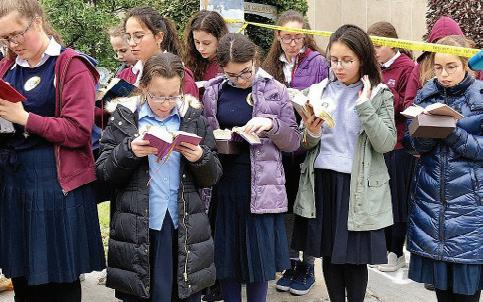
SPECIAL SECTION | 17 FAMILY MATTERS Treating pediatric pain with opioids and helping children and teens navigate the pitfalls of social media Israel halts ceasefire talks Marvel’s Stan Lee dies Toronto: Jewish teens assaulted ISRAEL NATIONAL INTERNATIONAL NOVEMBER 16, 2018 | KISLEV 8, 5779 VOLUME 70, NUMBER 60 $1.50 HEADLINES | 6 MEMORIALPITTSBURGHEVENT Pittsburgh residents, celebrities and dignitaries gathered to honor Tree of Life victims SEE TRAUMA, PAGE 2

Please subscribe and continue to support JEWISH NEWS with a tax-deductible contribution. Complete the form below or go to jewishaz.com/subplus
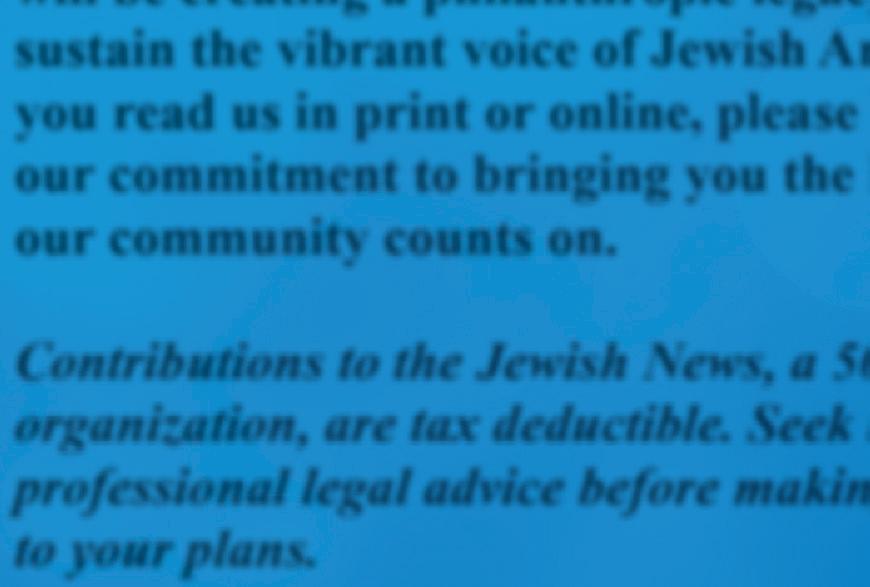

Arizona’s problem is not as big, but still has an impact on prisoners and visitors. But that has not stopped the Aleph Institute from providing its services.